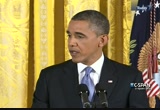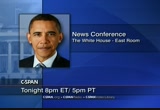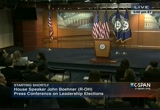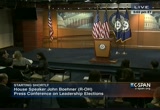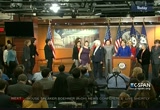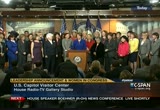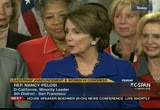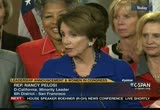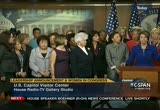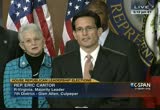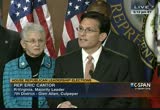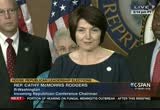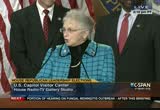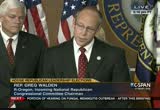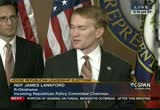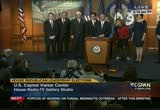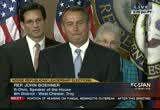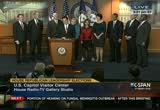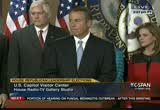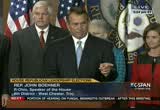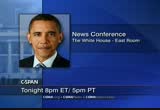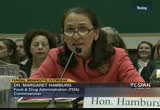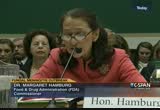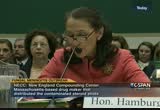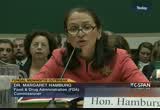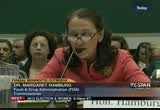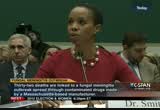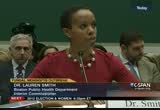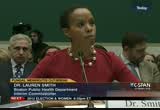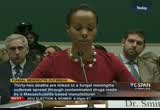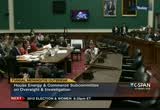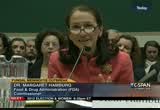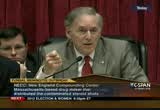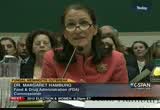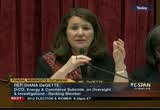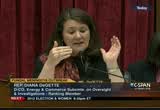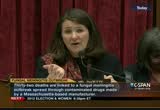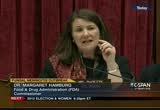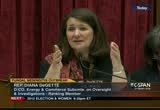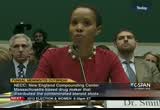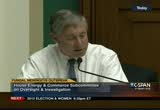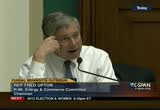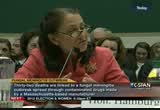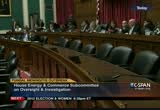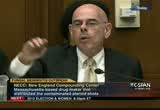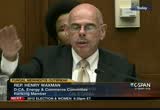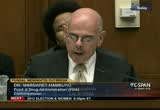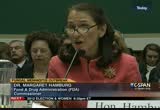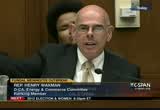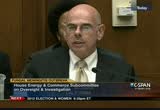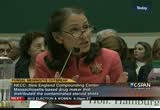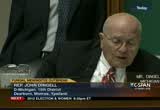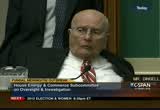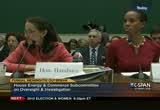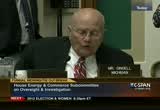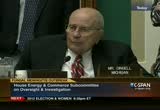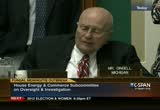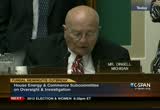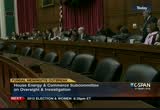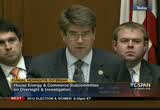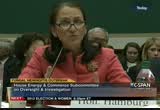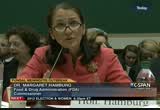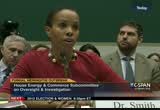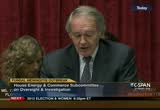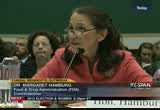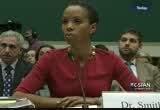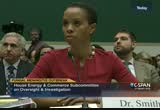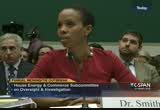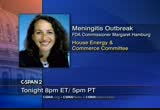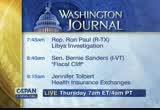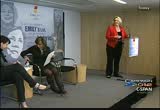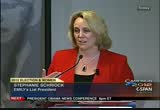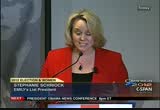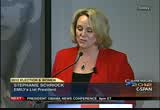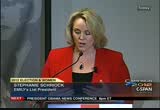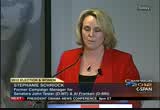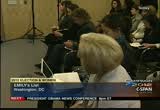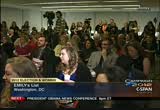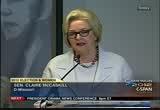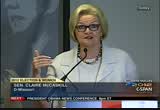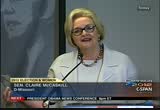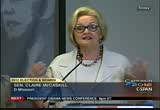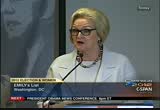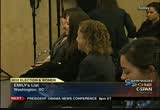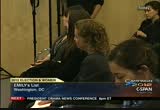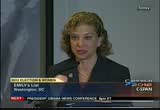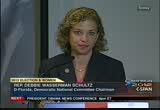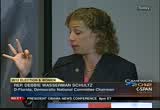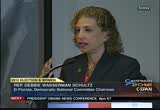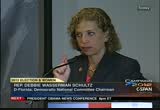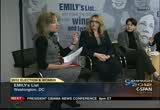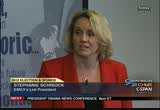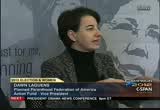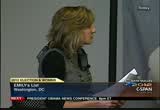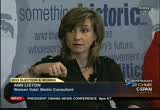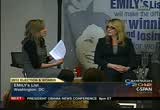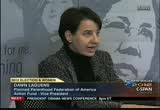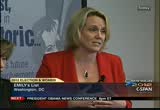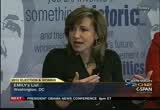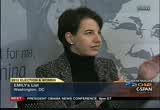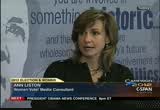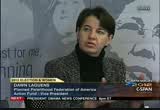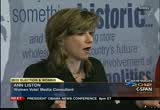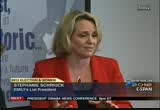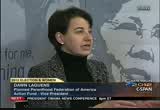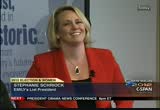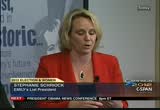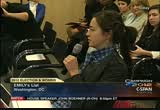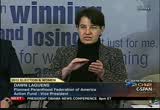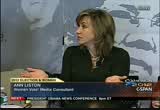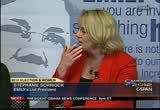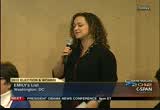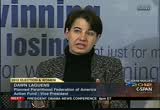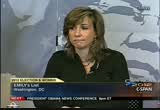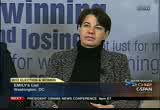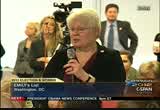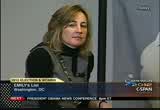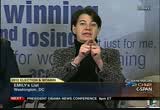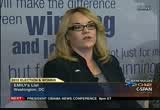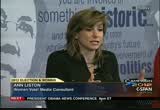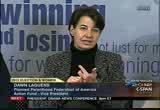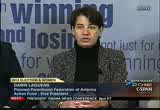tv Public Affairs CSPAN November 14, 2012 5:00pm-8:00pm EST
5:00 pm
5:01 pm
captions copyright national cable satellite corp. 2012] [captioning performed by national captioning institute] >> you can watch online at any time at c-span.org. we are going live now to capitol hill. house speaker john boehner is holding a news conference about the house republican elections. kathy mcmorris rodgers has been elected to be house g.o.p. conference chairman and beat tom price who was endorsed by paul ryan who was the republican vice presidential nominee. and a couple of leadership positions will stay the same, including majority leader eric
5:03 pm
>> we are waiting to hear what happened from house speaker john boehner. a bit of background, one house republican sought to nominate newt gingrich for house speaker. we will have speaker boehner shortly. nancy pelosi announced that she plans to stay on as the leader of the house democrats and made the announcement at a press briefing and said, quote, i wouldn't think of walking away.
5:05 pm
>> i think that means most of them are here. good morning. more are coming. more are coming. yesterday, when we gathered here, i began my comments standing here with our new members of congress by saying a picture is worth 1,000 words. that's what they say. i said then and i say now that this picture before you is worth millions of votes. millions of votes. [cheers and applause]
5:06 pm
>> millions of women's votes that it took to re-elect president obama. millions of women's votes who help us elect a number of women to the congress of the united states. as you look forward, understand that you are looking into the future. the future of empowerment of women in america. you saw some of these faces yesterday among the new members-elect. i said then that they were part of the most diverse caucus in the history of the world, the first time that a parliamentary body would have a party who had the majority of women and minorities. that's its strength. and we are very, very proud of that. i said yesterday, we did not have the majority, but we have
5:07 pm
the gavel. excuse me. we don't have the gavel. [laughter] we don't have the -- [laughter] >> we have our own gavel. we have something more important . we have unity. we do not have the gavel. we do not have the majority, but we have unity. i think our caucus demonstrated that this morning very clearly. so i come here with my sisters. when i came to congress 25 years ago, there were about 23 members of congress who were women out of 435. just think of that. 11 -- today we have over 60
5:08 pm
house democratic women. [applause] >> very good. not enough. we want more. but all of us who were there that dozen of us here, we all took responsibility to try to pull more women into congress in our state delegations and across the country. i'm very proud that in california, our delegation of democrats is the majority of women, not even counting our two senators, senator feinstein and senator boxer. so women are empowered in california. i want to acknowledge that although our numbers are great here, two of our colleagues have gone onto the senate. senator-elect tammy baldwin. and senator-elect hirono.
5:09 pm
so that's pretty exciting. and unfortunately, we won't have kathy hoke will and betty sutton in the next congress, but the future is coming upon us and they will be making a great public contribution. so here we are. in the past week since the election, we are still finishing up our campaign. we are proud of the success, as i said yesterday and as you see here today. why is it important for us to make this statement of the strength of women in the congress of the united states? the house democratic women? because this is where the hopes and dreams of america's families are riding. they may not know that. they may not know one party from the next and the rest. but we know that without rosa
5:10 pm
delauro, we wouldn't vr lilly ledbetter and the pay fairness act. without gwen moore, we would not have the vial ns against women act being put forth. and representative sanchez to protect women in the military. we are so very, very proud of the chair of the democratic national committee, debey wasserman schultz, who is here. [applause] >> i could go around here and talk about the leadership. certainly susan davis, women in the military has been with her for a long time. >> you can see the rest of this at cspanch dorgan we go live to
5:11 pm
john boehner and the elections in his republican caucus today. >> republicans are humbled by the voters and focusing on their top priority which is jobs. i'm proud of my leadership caucus who are going to serve. and while some of us who are returning to the leadership, we have new members and you will get to hear from them in a moment. our majority is the primary line of defense for the american people against a government that spends too much, borrows too much when left unchecked. i have outlined a framework for how both parties can work together to avert the fiscal cliff without raising tax rates and through a combination of pro-growth tax reform and
5:12 pm
entitlement reform, we can bring jobs home and make our economy stronger. listen, with so many challenges that are ahead of us, the american people need to see us act courageously, think selflessly and lead boldly and our majority is up to the task and i expect the president is as well. >> good afternoon. we wept through a tough week last week as a party, but clearly the house majority is intact and we are strong. i have never been prouder of my colleagues than i am for having stood strong for the things that we believe in. i'm especially proud of paul ryan that took the charge across the nation of the kind of a solution-on the parted agenda we have been about for the last two years. as the speaker said, we stand to do right for the people of this country to extend our hands to say yes, we want to help those
5:13 pm
who are in trouble, those who are having tough times and we want to help people in this country get back to work. we are going to be about a results-oriented majority and solutions, just as we have had in the past and we want solutions to get people back to work and save medicare for those who need it, solutions in place for a myriad of challenges that people are facing. and that's why we say to this president, we want to work with you on solutions. we don't understand why raising tax rates is the solution if you want to see people get back to work. the speaker has extended his hand to say we want to work with you, mr. president. we understand he won re-election and want to go forward together in cooperation to solve the problems, not just posture. >> i'm honored to serve one more
5:14 pm
time as whip. it is the second largest republican majority since world war ii. the elections are over and now time to get to work. we have a new leadership team. very diverse team, we have an accountant and a college president. a unique team and ready to put america first and that's what we are looking forward to do. we are willing to work across the aisle with those who want to work with us. we want to put people before politics and that's what this leadership team will do. >> we stand before you today as the null elected leadership team for republicans for the 113th congress and it is a team that represents every corner of this country, come from all different experiences and backgrounds and we are committed to moving this country forward, to getting america back to work, to solving the fiscal crisis that faces the
5:15 pm
federal budget and being part of the solution moving forward. that's our challenge and that is our goal as we approach the 113th congress. >> i'm humbled to be on the stage with these folks today and honored to serve as the conference vice chair and as a momma with a 21-year-old and 18-year-old, jobs and the economy is going to be our main focus. last thing i want is for them to graduate from college and come live in my basement. i'm pleased that house republicans have run to the problems of the day with our budget solutions, our job solutions and you can count on this leadership team and the republican conference to continue running towards the problem and look forward to working with the administration and senate and negotiating throughout the next few months. >> you have heard people use the
5:16 pm
words team, working together and solutions. those are going to be our mantra and want to help the american people get back on their feet through creating jobs and for us to work together to do that. we are solution-driven and that's the direction we will be going. >> i think throughout this nation from south carolina and washington state, we have many members of congress who are looking forward to move this country forward. they aren't thinking of republicans and democrats but feeding their families and making ends meet. you have a leadership team here who understands and appreciates the necessity of getting that accomplished. >> i'm greg walden, second district, elected as chairman of the new congressional republican committee. we suffered some losses as well and some of our colleagues will not be returning.
5:17 pm
but we have the second largest margin in the house since world war ii. back-to-back, biggest margins republicans have had. our goal going forward is to solve the american people's problems and find solutions here in washington and grow our majority in 2014. we can get it done and intend to do it. >> my new job after leaving the national republican congressional committee, i have been asked to be chairman of the rules committee. it is my job to work with chairman boehner and all the chairmen of our conference including our great majority leader and our whip on having legislation that the american people well understand and see that we will produce legislation that is prepared for them to add jobs to make this country better and make it stronger. i look forward to this challenge. thank you. >> i'm the policy committee
5:18 pm
chairman. this republican conference is known for ideas and solutions. it's not personality-driven but on a set of solutions that the american people can look at and say that will fix the problem. work with outside groups, people on committees, whoever has the best ideas, they will pull those things together and provide solutions for the american people and that's what we are focused on. there are issues on a wide variety of things that need to be taken on this session and pull those ideas together and solve them. >> speaker boehner, the president said -- bush tax cuts for families making $250,000, give sernts to business and deal with the rest of the fiscal cliff, why not do that? >> instead of the house moving on the senate bill, the senate ought to move on the house bill.
5:19 pm
there are a lot of issues on the table that have to be resolved by the end of the year and i think i have laid out a reasonable framework where both parties can work together and i'm looking forward to go to the white house on friday and beginning our conversations. >> is there a reason you can agree on that, at least, that you can't just knock that out right away? >> the issue is, we aren't going to hurt our economy and make job creation more difficult, which is exactly what that plan would do. it's not the direction that we want to go because it's going to hurt job creators in america. yes, ma'am. >> thank you, mr. speaker. [laughter] >> my question for you is, given
5:20 pm
that the president has stated his position in going forward in these negotiations, you have your positions, how do you anticipate the whole process to unfold on friday? what do you expect to hear from the president and the difference of what he said today? >> if you look closely what the president had to say and look closely what i had to say, there are no barriers here to sitting down and beginning to work through this process. i don't think anyone on either side of the aisle underestimates the difficulties that faces us. the spirit of cooperation you have seen over the last week from myself and my team, from democrats across the aisle, from the president, have created an atmosphere where i think that i remain optimistic. i was born with the glass half full. if i hadn't been, i sure wouldn't be here.
5:21 pm
>> mr. speaker, the president made it very clear in his desire to have the wealthiest americans pay more taxes. now, leaving tax rates off to the side, do you think the those making above $250,000 --? >> i look forward to my conversations with the president. >> my question is for leader cantor. i wanted to ask you about the f.b.i. tipster that came forward to you about general petraeus, what did he tell you and do you have any questions about his credibility given he sent a shirtless picture? >> all i'm going to say, i received information from an individual that i had not met before and did not know the
5:22 pm
information that was sent to me sounded as if there was a potential for a national security vulnerability. i had no way of corroborating the story that i was told and felt the best thing to do at the time was not to politicize it but to put national security first and that's why i turned to director mueller's office to ask them to do their job and assume that the f.b.i. would comply with its obligations to keep us on the hill informed once it was determined whether an investigation was necessary or a crime had been committed. >> just a comment -- [inaudible] >> senator mccain wants a wear gate sort of probe into this matter, would you get behind
5:23 pm
these types of -- >> i think the standing committees of the house, the oversight committee or the intelligence committee are working diligently on these issues. and at this point, i think that's appropriate. >> you violated the rules. sorry. >> are you at all concerned that there are some in the democratic party that would like to replicate the situation something comparable to the payroll tax last year and inflict political pain. >> did you say democrats? >> yes. >> members on both sides of the aisle have ideas about how to
5:24 pm
resolve this. and some are more interested in politics. if we stay focused on what's the best interest of our country and to the american people, i'm confident that this issue can be resolved. >> secretary geithner said he didn't think you could raise enough revenue merely by capping itemized deductions to reach the revenue goal. give us an idea here of what -- >> no, i'm not. >> can you tell us what the mathis. >> there are ways to put revenue on the table without increasing tax rates. we have talked about this now for over a year. there are all kinds of information and data out there, but getting into the specifics of that at this point would not be conducive to try and come to agreement with the white house.
5:25 pm
>> last question. >> the payroll tax cut is part of the fiscal cliff. is that something you feel should be renewed here at the end of the year? >> there are a dozens of issues that have to be dealt with at the end of the year, that being one of them. a lot of this will take place beginning on friday in our conversation with the president. thanks.
5:26 pm
5:27 pm
legislation that is needed to prevent such snepts from happening again. i want to begin by offering my deepest sympathies to the patients feathed by this. this event had devastating effects such as judge love lace, many of whom were unaware they were being treated with a come pounded product not reviewed or approved by the f.d.a. since the onset of this outbreak we targeted resources from experts in our headquarters, and labs across the country to do everything we can to stem the toll of this terrible event. we have sought to identify potentially contaminated products and ensure they are removed from the market. we have collected and analyzed samples as well as medical
5:28 pm
facilities to isolate the cause and determine the extent of the contamination. we are working daily to ensure clearly and timely information and what products are affected and what providers should do with any products still on their shelves and working to alleviate existing drug shortages. we have been reviewing actions taken in the past with regard to necc. from our review, we have no reason to believe that any of the specific actions in question, more timely issuance of the twikes warning letter would have prevented this recent tragedy. what we do know is stronger, clearer authority would enable the regulation of the compounding industry. as it is, our authority over compounding is limited, unclear and contested. and in the face of differing
5:29 pm
views in congress and the courts about f.d.a.'s authority and continuing challenges, the industry has struggled to protect the public health. we recognize the additional compounding provides an important service for patients who can't swallow a pill or allergic to an ingredient in a drug product. but the industry has evolved well beyond the neighborhood pharmacist. the movement by hospitals to outsource has created a market for compounding operations to produce larger drugs. when these facilities operate well, they may serve an important function in terms of safety and efficiency. however, when they follow to follow safety standards, many patients may be harmed. our best information is there are thousands of other compounders out there producing what should be sterile products. and many other firms with the
5:30 pm
potential to generate a tragedy like this. the current oversight framework in attempting to draw a bright line between compounders and manufacturers, fails to address the complex issues. gaps in the law have hampered our ability to prevent rather than react to safety concerns. i'm committed to working with congress and other stakeholders to design a system of risk-based regulation that takes into account the federal and state roles. as i outlined in my testimony, we developed a proposed framework that would be to the type of product. traditional compounding would remain. the higher risk posed would be addressed by federal standards including standards for quality control. and under this framework, certain products carrying the
5:31 pm
highest risk could not be come pounded and produced by industry currently. we would like to explore with you authorities that would be important to support this new regulatory paradigm and clearer authority to access records, mandatory reporting of adverse events, additional registration requirements and coordination with state regulators and allow prescribers and consumers to make informed judgments and adequate funding to support the activities outlined in this framework. and because a key piece of any plan will continue to be performed at the state level, we must work closely with our state partners as we develop the framework for new authorities. consequently, f.d.a. will be inviting representatives from all 50 states to participate in a full-day meeting on december 19 to facilitate in these
5:32 pm
discussions. we have the collective opportunity and responsibility to help prevent future tragedies. if we fail to act, this type of incident will happen again. it is a matter of when, not if. if we fail to act now, it will only be a matter of time until we are all back in this room sadly asking why more people have died and what could have been done to prevent it. i'm happy to answer any questions you may have. >> thank you, dr. smith for a summary of your opening statement. >> thank you ranking member stearns and ranking member degette. thank you for having me here today. i'm the interim commissioner of the massachusetts department of health. my thoughts are with the victims and families affected by this tragic outbreak and mrs.
5:33 pm
lovelace whose testimony strengths thens my resolve and described the heartbreak. as a mother, doctor and public health leader, i have devoted my career to protecting the health of others. these events invokes in me the same sense of outrage for me and the rest of the public. this hits very close to home. for the past two months, our department, along with the f.d.a. has conducted a joint investigation of new england compounding center, the source of this devastating outbreak that has sickened hundreds and killed 31 people across the country. we have investigated and shut down necc's sister companies. necc knowingly disregarded sterile whyy tests and violated their pharmacy license. they bear the responsibility for the harm that they have caused with these actions.
5:34 pm
i was given the responsibility of interim commissioner less than three weeks ago to lead my department through this crisis and like you, i have been trying to put together the pieces of the puzzle. first licensed by massachusetts in 1998, necc and its owner, have since been the subject of numerous complaints resulting in a series of investigations by the state and f.d.a. these investigations led to the board of pharmacy's proposed reprimand and protection in 2004. this proposal was weakened in 2006 aloug them to continue to operate without disciplinary action pending an independent evaluation of its progress under a consent agreement. the board of pharmacy's failure to take decisive disciplinary action in 2006 following the complaints has contributed to these tragic events. in april of 2006, the board of pharmacy staff learned that the
5:35 pm
principal of p.s.i., had been convicted of federal crimes that resulted in 18 people being blinded, however the staff did not share this information with board members before they accepted the report from p.s.i. validating their compliance with the consent agreement. they failed to act on a july, 2012 report that necc had violated colorado and massachusetts pharmacy regular layings. these staffs have been removed from their jobs. poor judgment, missed opportunities and lack of appropriate action allowed ne crmp c to continue on this troubling path. we acknowledge that these lapses were preventable but all unacceptable. our department has acted swiftly and decisively. we secured surrender of their license and shutdown of operations and recall of all necc products.
5:36 pm
we moved to permanently revoke their license as well as the licenses of the three pharmacists that oversaw their operations and suspension of operations. two other drug manufacturers opened by them. which as you know has been found to have similar substandard practices. while taking the strong and necessary actions, we re-examined our state regulations regarding come pounding pharmacies. they need to be strength thepped to address the reality. on november 1, massachusetts enacted a series of emergency regulations to bring greater scrutiny to this industry and required compounding pharmacies to report information to us. licensed pharmacies will have to report when they are the subject of any state or federal investigations. we have also begun unannounced investigations of compounding
5:37 pm
facilities in massachusetts. teams are conducting these investigations even as we speak. to further strengthen our oversight, we must explore changes to the law. we have created a special commission to review best practices in other states and to identify stronger mechanisms for oversight for these pharmacies in massachusetts. as we work to raise standards in our state, we urge congress to act to strengthen federal oversight. congressman markey's leadership is laudible and would address the black holes that exist between federal and state oversight. as a pediatrician who has cared for acutely ill children and families for over 20 years, i understand the trust that patients place in our health care system. we must use these tragic events to work together. public health leaders and officials and legislators to institute reforms to restore
5:38 pm
this trust and ensure that nothing like this ever happens again. we will keep the victims and our families in our thoughts. they are not numbers or statistics but real people with real lives. as we work to identify and implement policies and practices that can be effect tive and lasting. thank you. i appreciate the committee's interest in this matter and i'm grateful for you acting so swiftly. >> commissioner hamburg, the title of this hearing is fung you will meningitis outbreak, could it have been prevented. your testimony is 16 pages long. there is one sentence on f.d.a. oversight on the compounding facility. this is an investigative hearing. this was a complete and utter failure on the part of your agency and dr. smith in her
5:39 pm
testimony admitted and the state board of pharmacy, the committee's member rand umh we did, we had 25 pages laying this out, yet, you devoted just one sentence of your 16 pages in your opening statement that even talked about this oversight. over the years, the f.d.a. repeatedly documented numerous problems at the necc. many of these problems are similar, if not identical to the same problems which caused this outbreak. the agency ultimately issued a warning letter in 2006 stating that if the examine did not alter its practices it would issue an injunction and shut down necc. you heard dr. smith, she talked about the mistakes they made and what they are going to do to correct it. you are here, you are practicing
5:40 pm
plausible deny built. when they issued the warning letter, did they seize the drugs and shut down the examine? -- company? yes or know? the question is did you have the authority? >> failures and it was not in relation to the kinds of problems that we are addressing now. >> you are saying your letter was an empty threat? >> one of the great challenges -- >> did you think >> it is important to understand -- >> i understand that and appreciate that. the frustration we have. >> the warning letter and the inspection had to do with a different set of concerns. >> do you think the f.d.a. had the authority to shut down necc, yes or no? >> that is a very, very complex
5:41 pm
question in that the -- >> you can't answer that question then? >> for the framework of f.d.a. activities. very, very clear. >> if you aren't going to answer the question -- >> can she answer the question? >> she's not answering the question. i asked her yes or no and she won't answer the question. this -- you can answer the question. >> the answer to your question is that even on much smaller regulatory actions, the f.d.a. authority to act was contested, even going into necc to do that inspection in 2004, we did not -- >> i'm asking the questions and i only have so much time. you issued the letter in 2006. you said you were going to shut it down if they didn't improve on the quality assurance. was that an empty threat? did the f.d.a. have the responsibility to shut it down?
5:42 pm
>> the warning letter concerned first and foremost, an issue that had to do with making copies of a commercially -- >> we have a different interpretation of my question. when the f.d.a. inspected the necc in 2002, there was evidence that people had been infected by contaminated by these products. what proof did the company provide then that it had corrected these problems? >> as i think you understand from the documents we provided and the information that's been discussed, it was -- we wept in and found problems and worked closely with the massachusetts board of pharmacy to address them, but it was determined that the primary responsibility for overseeing necc was massachusetts, because they were operating --
5:43 pm
>> you were defering -- >> we worked with the state and tried to provide health and assistance but the responsibility for assuring -- >> it's not your job but the state of massachusetts. before the current outbreak, the last time f.d.a. inspected the necc was in january, 2005, which led to the warning letter. it stated it may conduct follow-up inspections to ensure that the necc was in compliance and not a follow-up inspection that occurred after 2005, is that correct? yes or no. >> the >> there was not a single follow-up inspection that occurred after 2005. >> i did not do >> that's a yes. after noting >> i cannot speak to all of the issues that were involved. >> you are taking my time. let me finish.
5:44 pm
after noting violation upon violation from 2002 through 2005, why did the f.d.a. feel confident that the necc would correct its violations and obey the law? you had all these violations, what made you think they would correct them. not you personally. i understand you weren't there. >> concerning the sterility issues, we acted in partnership with the state of massachusetts. but the day-to-day responsibility for overseeing the practice and remediating the sterility failures were taken on by the state of massachusetts, who had the primary day-to-day oversight of this compounding pharmacy, a consent decree was reached in 2006 and we had understood as had the massachusetts board of pharmacy, that they were appropriately addressing the sterilty
5:45 pm
concerns. we had gone in from a complaint from a company about the copying of an f.d.a. drug and in that instance, we went in relation to the manufacturered specific product, it was not an issue of sterilify failure or the conditions of the facility but it was a practice that they should not be pursuing and that's what we were trying to address. >> my time has expired and i recognize the ranking member, mrs. did he get. >> i want to -- mrs. degette. >> most of the f.d.a. inspections into this manufacturer, necc, were 10 years ago, correct, and that was
5:46 pm
under the f.d.a., under the bush administration, correct? >> that is correct. >> now in 1997, i was actually here then, the f.d.a. modernization act excluded the -- well, it excluded drug compounders for the most part, is that correct? >> if a pharmacy was operating in accordance with certain conditions, they were excluded. >> the f.d.a. didn't have authority over those compounders, correct? >> that's correct. >> after the 1997 act was passed, it had to go over the hurdle of determining whether those conditions had been met or not before the f.d.a. was determined to even have authority, is that correct? >> correct. >> so what happened here is that the f.d.a. was contacted in 2002 about some problems.
5:47 pm
they went into necc and found some problems and there was a whole series of investigative efforts after that, correct? and one of the issues, in this case and in other cases is whether the f.d.a. even had authority to be investigating complaints whether or not this particular manufacturer fell under the appropriate criteria, right? >> with respect to the public health threat that was identified in 2002, we went in and aggressively investigated and worked with the state of massachusetts to get those contaminated products recalled to prevent ongoing damage to patients. then because this was a compounding pharmacy with the primary facility resting with the state board of pharmacy, they were responsible for the
5:48 pm
efforts -- >> who is they? >> the massachusetts -- >> massachusetts was primarily responsible because it was a compounding pharmacy. >> yes. >> in other cases, not particularly necc, but in other cases, when the f.d.a. tried to get there, they were sued in court by these companies saying the fed didn't have jurisdiction over these pharmacies, correct? >> correct. >> there is a court case that covers part of the whole country that says the f.d.a. doesn't have jurisdiction, is that right? >> the challenge we have today is there is a patchwork of legal authorities that really oversee the regulatory actions that we can take. we have a splilt circuit court decision. there's a map that we have that
5:49 pm
shows that, you know -- unfortunately, we have unclear fragmented regulatory legal framework that make it very hard to understand how best to exercise -- >> if you have an emergency like this, if you have an emergency like this, sometimes, what you are afraid is, you are going to act aggressively but afraid you are going to be hauled into court and that's why you go to the state regulatory agency shes is that correct? >> the fact that we have unclear, limited and contested authorities and a.m. big you yits in the law and crazy quilt of legal authority has required us to be very reactive to respond to those public health threats and every resource is intensive and will end up in litigation. >> let me ask you this, if
5:50 pm
congress clarified what we meant in the 1997 act with these large compounding pharmacies that we intend to give f.d.a. jurisdiction that will help you to be able to protect these patients better by either doing inspections to prevent these problems in the first place? >> absolutely. >> thank you. i appreciate the efforts that you are making since you took over, but again most of these things that happened, in fact all of these things that happened, happened before your tenure, dr. smith. and i would like to know and in reading all the documents and all of the history of this it is obvious to me that the ball was dropped and dropped in a big way by the massachusetts' regulators, what is massachusetts doing now to make
5:51 pm
sure this never happens again? >> i agree with you, there was missed opportunities and lapses of judgment that show that we have taken action. in terms of what we're doing now, i think the highlight now would be the enactment of the emergency regulations, importantly, which would allow or require sterile compounding pharmacies to produce information regarding volume and information. the volume information being so important because if you are making -- looks like you are more of a manufacturer than the traditional compounder. we require pharmacies to provide information on any state or federal investigations that concern them. that would allow us to have known that your state, board of pharmacy had issued a cease and
5:52 pm
desist in april of 2011 for the same issue in providing bulk prescriptions for patients. and lastly, we have done the -- convening a special commission to understand what are the best practices in strengthening the oversight of this evolving industry. we clearly are committed to making sure that this doesn't happen again and we want to do everything in our power to do that. >> thank you. thank you very much, mr. chairman. >> the chairman of the full committee, mr. upton. >> thank you, mr. chairman. i want to remind all of us here that this committee has a very long tradition even before john dingell, of working with strong members to identify problems in this country, to expose that and then coming back with legislation to fix it so it
5:53 pm
doesn't happen again. and one of those -- as we all review this case and see what was there, recent inspection, the leaking boiler, the bird flying around, i mean it's just -- what gives? if this was found just recently and it's our understanding there are similar types of contamination in earlier years, what is the problem -- what is the problem by not shutting down something like this until it's corrected? and if you don't have the authority, then we need to make sure that it's there. and seems pretty reasonable that you did have the authority to not only have unannounced inspections, but to come in and correct it some it didn't get to
5:54 pm
this stage, certainly with the deaths of people across the country and the questions that are raised today. and as part of the tradition of this committee, we have to have the right information to find out something. and i guess one of the concerns that i have in a bipartisan letter that was sent nearly a month ago, we asked the f.d.a. for documents for internal communications to find out what discussions were going on, what was the feedback from the company. and it's my understanding that to date, we have some emails that have come back, but not anywhere close to what he we ought to have as we try to move the investigation forward and try to get to the very bottom of this and make sure that it never can happen again. and i would ask commissioner hamburg, if we could have a
5:55 pm
commitment from you as it dates back to the letter we sent to you back on october 17, that we get the full cooperation from your staff so we can come back and ask questions and really try to get to the bottom of this to identify where are the problems, because clearly they were there, right? >> we will work very hard with you. we appreciate the work that this committee is undertaking and have tried to get you documents in a timely way. so far, we have been able to get you pages of documents, but unfortunately we are pursuing the active public health investigation response and many of the same people that are involved with the right expertise and knowledge of the issues are working on that at the same time that we are trying to get you that information. and of course, as congresswoman degette pointed out, this concerns activities, some of it
5:56 pm
going back many years to a different administration and different employees at the f.d.a. so we are going through, trying to get all those documents and will be continuing to provide you with the information you've requested. >> i want to say, i had a long discussion last month during the break with my colleague, mr. dingell. very frustrated about what was going on, wanting to get to the bottom of this, wanting -- as we all think about the f.d.a.'s proper role, this would be it. i mean as we all identify facilities in our own districts, i know when i go visit, it is clean as a whistle, it really is. people are proud to have the jobs that they have. it's as sterile as you can imagine. and i can't for the life of me, as we read about this information from eyewitness accounts and inspections that
5:57 pm
were there before, and to have it gone on and on and on without a follow-up, that is not what anyone is expecting the f.d.a. to do. it needs to stop. and americans, we demand that for manufacturing here. we also expect it to happen overseas. and a in your inspections in china and other places that the products that are being produced are safe for not only americans but all humans. and when we get terribly frustrated and i know you tried to call me yesterday afternoon and we will continue to communicate, but we want to get to the bottom of this. we want to find out what really did break down. and where are the questions that have to be answered so in fact, you do have the baseball bat to go after these companies that
5:58 pm
are -- it's not right. and this is not going to be the last hearing, because we don't have the information we need to proceed. so i would like to get -- and i know my time is expiring, but we would like a commitment that you will be responsive to the questions that are asked by republicans and democrats, so we can figure out where this train got off the track and put it on and we can assure every person in this country that in fact the f.d.a. is working as it should and we shouldn't have to hear the stories that we did earlier this morning about mrs. lovelace and our constituents whatever states they are in. and this is not a one-time deal. >> you have my absolute commitment we will continue to work with you and all of your requests for additional information. you touched on a very important point that i want to underscore,
5:59 pm
we have responsibility for oversight of manufacturers and drug facilities in this country and around the world, but our authorities to provide oversight of drug manufacturers is very different than our authority to oversee compounding pharmacies, whichr in fact, exempted from important aspects of f.d.a. law and there is this disconnect between different legal requirements in different parts of the country as well. we have ambiguous, fragmented, unclear and contested authorities in this particular realm of pharmacy and drug manufacturing practice. and that is what our opportunity is now and what our responsibility, i think is to work together to really create new legislative authority that
6:00 pm
defines the best approaches that gives us the broader authorities that we need to address this growing arena of what we call nontraditional compounding that involves larger volume, more complex products, including sterile products and broader distribution, potentially putting more patients at risk and there are gaps in the oversight authority of the state to have primary responsibility for overseeing compounding facilities and the f.d.a. and we have to make sure we have a seamless system that protects patients. >> the gentleman, mr. waxman. >> i think this me needs to respond on a bipartisan basis and we need to correct the law. we ought to try to do it before we leave at the end of this year. nor simple reason. you get into she next year, some of these interest groups
6:01 pm
are going to gear up to stop legislation. they'll say we really don't need to have the f.d.a. look at these compounders. f.d.a. regulates the manufacturers but the compounders are going to be regulated at the state level. you're being criticized, dr. hamburg, as the head of the food and drug administration for the problems problems that were primarily the responsibility of the state of massachusetts. often we hear on this committee, we've got to let the stays handle thing, not the federal government. in fact, i want to express sympathy for you and the f.d.a. because you're in a no-win situation. when the f.d.a. asks for more data to determine whether a drug is safe and effective or takes enforcement action for violations of good manufacturing practices, the agency is accused of being a job killer. an overregulator. but now when something terrible happens, we hear the funding
6:02 pm
went -- that something went wrong and everybody is quick to jump on you for not doing enough. if we expect you to do more we better be sure that the statutory law that gives you enough authority to do your job. if we want you to do the job and not the state to to do the job. let me be very critcoofl the state. the state of massachusetts dropped the ball. they entered into a consent decree with a company and said, it was a weaker consent decree than they started with, and said you ought to get an independent inspector. the company hired an independent inspector and the independent inspector came back and said everything is fine. then there were questions about whether this was an inspector that was independent? which is a good thing to keep in mind when we say let the company december side who to pick to investigate themselves. let's look at what we can do now. how many compounding pharmacies are there in the united states? >> you know, we don't know the
6:03 pm
exact number because they are not required to register and so we're really uncertain. there are thousands of pharmacies that do compounding. for we think there are ability 7,500 that do more advanced compounding and 3,000 that do sterile compounding. >> compare that with manufacturers where you have the jurisdiction to inspect them and approve or recall their drugs. how many manufacturers are there, factories, facilities, compared to compounding facilities? >> the -- there are about 5,600 manufacturers that we provide oversight for. including regular inspections. and there is a broader array of facilities that we also oversee in that context. >> in 19997, congress attempted
6:04 pm
to codify an f.d.a. regulatory system with respect to these compounding pharmacies. but then the supreme court later invalidated a part of that law and -- raising the question of whether the rest of the law is still enforce -- in force. some have carged the f.d.a. has the ability to cobble together other authorities to act to prevent this tragedy caused by necc. i don't know if that's a realistic possibility or not. what i do know is at the very least there's a dangerous lack of clarity in f.d.a.'s authority here. we should fix that. do you think there's a lack of clarity? >> i think there's an enormous lack of clarity. i think we should seize this opportunity to address it. we -- >> what authority and enforcement tools does the f.d.a. need to better enable you at the f.d.a. to take effective action when you discover problems that -- at compounding pharmacies? >> we feel there needs to be a risk-based framework that
6:05 pm
enables us to play our critical role in overseeing drugs that are going to the american people. compounding has an important role in addressing medical needs. and traditional compounding is probably best overseen at the level of the states, though it should always be undertaken by a licensed pharmacist or physician and in accordance with a prescription far patient. there is an area of nontraditional compounding where we think really there needs to be focused attention and new legislation. >> all pharmaceuticals that are compounded don't need to be regulated by the f.d.a. because the traditional way we think of it is pharmacist putting together a scription for somebody who has a special need. but now we have an example of a company that's shipping it all
6:06 pm
over the country. making the drug and shipping it, they're like a manufacturer of the drug. what we need from you is very specific authorities that you must have to be able to deal with this and the second thing we need to recognize is your budget. if we give you authority and there are thousands of compounding pharmacies, your agency,ky can't imagine has the resources to regulate every single one of them and we need to -- you need to rely on the states to complement the f.d.a.'s oversight. is that a fair statement? >> that is certainly a fair statement. with respect to the authorities, i did outline in the testimony but we clearly believe that for nontraditional compounders, there should be federal standards that would establish basic safety measures including sterility controls, could be enforced by the state or by the f.d.a. but those need to exist. then we need standards, now authorities around registration
6:07 pm
so we know who is out there and what they're making. we need to be table see records. >> you're right. i want to say to chairman upton and for the record all the members of this committee, that we need to get this information. we have to get the right balance. we ought to do it before we leave at the end of the year. and make it very clear that we're not just saying, you're at fault, you're at fault, somebody else is at fault. we're going to be held responsible as members of congress to make sure the law is clear and that the agency has the ability and resources to do the job that everybody expects you should have done and we want to make sure you're able to do it. thank you. >> the gentleman's time has expired. the gentleman from texas is recognized for five minutes. >> thank you, mr. chairman. we have a tragedy of significant proportions here. 32 people have died, probably more will. we've got a bipartisan investigation before the
6:08 pm
subcommittee. we understand that business as usual is not acceptable. having said that, apparently the f.d.a. has decided this is something that they can use to be able to get more authority to regulate and inspect certain that compounding pharmacies do. if there really is a lack of regulatory authority at some level, then that's legitimate policy recommendation. but if there's not a lack of regulatory authority in existence at state and federal law right now, then it's unnecessary. my first question is to both doctor hamburg and dr. smith, are y'all both stating that under current state and federal law neither the state nor the
6:09 pm
f.d.a. had the authority to seize these drugs or shut this company down? >> i think it's important to understand -- >> i want -- i don't need a long -- i think it's important. either -- if the state of massachusetts zrunt the authority and the f.d.a. doesn't have the authority, that's one thing. but we have a warning letter in 2006 issued by the f.d.a., this is before you were the commissioner, it says failure to promptly correct these deviations may result in additional regulatory action without further notice including seizure or injunction against you and your firm system of in 2006, in the f.d.a.'s warning letter, it was the thought at that time that the f.d.a. had sufficient authority and dr. smith on behalf of the -- he's only been on the job three weeks.
6:10 pm
we can't hold her liable for what happened 10 years ago, six years ago, seven years ago, but i don't think there's any question that if massachusetts felt there was a violation they had the authority to shut it down. so i think we ought to work on using the authority that we have as opposed to trying to get additional authority at the federal level. the f.d.a. went in and inspected this particular company on at least two different occasions and as far as i can tell, other than issuing one warning letter, didn't do anything. at all. >> the truth is that in the initial inspections, we worked closely with the massachusetts board of pharmacy which has the responsibility for license sure and oversight.
6:11 pm
>> we acted to make sure the contaminated product was recalled and not continuing to put people at risk. our first priority -- >> so you're saying the f.d.a. did have the authority i or did not have the authority? >> we worked closely with massachusetts who had the authority. >> can you ever give a straight answer to the question. either you do or you don't. >> i think you know what is very clear is that -- >> what's very clear is you don't want to answer the question. >> no, it's complicated and that's reflected here but the responsibilities are different, f.d.a. has clear and strong responsibility for an oversight -- >> let me ask dr. smith. >> to drug manufacturers. >> dr. smith does your -- >> compounding pharmacies -- >> does your state agency have the authority to shut this company down if you see a clear violation of the law? yes or no? >> yes it does. and in fact --
6:12 pm
>> thank you. the state of massachusetts has the oversight responsibility for compounding pharmacies on a day-to-day basis. f.d.a. has a different set of authorities and the challenge is that these authorities as evidenced by that map are fragmented and what enforcement actions we can take have to be seen through different lenses in different parts of the country. we don't have clear -- >> i'm going to try one more time, dr. hamburg. under current law, does the food and drug administration of the united states of america have authority over adulterated drugs? >> we have authority over adulterated drugs and we can take actions in relation to that. >> i ask that the gentleman from texas have one additional
6:13 pm
minute. >> i'm happy to yield to my friend from michigan. >> commissioner, two agencies here dropped the ball. the massachusetts agencies -- agency had to fire its head because it didn't do the job. and your agency, i don't want you dob defense -- to be defensive lew but your agency did not use your power to define who is a manufacturer. here you've got an agency that is -- that in just one has old over 17,000 doses in something like 23 states. don't you have the authority to define who is a manufacturer and who is a compounder? if you do, why didn't you do it? >> the problem is that the current legal regulatory framework says either your a compounder or you're a manufacturer. >> do they define -- you may befine both, may you not? you have that authority and you did not do it. >> my concern is that if it's
6:14 pm
all or nothing that way, then these facilities, if they were defined as manufacturers -- >> we are trying to solve the problem, this is not an issue where you are here to defend yourself. if you choose to do that, you're going to have a very hard time in this committee. we do not tolerate that kind of foolishness and i would assure you you are putting your head in a noose. ills urge you to cooperate with us and with my good friend and give us the answers we need so that you can address your problems. >> if i can reclaim the time i no longer have. >> we had unanimous consent to give mr. dingell one minute. the time now belongs to mr. barton. >> i want to be explicitly clear. if there really is a regulatory gap, based on the record that i've reviewed, i don't believe there is, but if there is, i suggest there's a bipartisan
6:15 pm
coalition on this subcommittee and full committee that will move legislation to correct it. if, however there is no regulatory gap, i also think there's a bipartisan coalition on the subcommittee and full committee to work to make sure that the state and the federal agencies with jurisdiction work together to solve this problem and to prevent it from happening in the future. with that, mr. chairman, i yield back. >> i thank the dean of the house of representatives for his taking the initiative to really get the commissioner to answer the question that mr. barton and myself and others have asked and that is whether you have the jurisdiction and the answer is yes. we recognize for five minutes, mr. dingell. >> i thank you, mr. chairman. commissioner, i would appreciate yes or no answers. do you have sufficient
6:16 pm
authority to inspect compounding farm sis, yes or no? >> no. >> will you please submit to us what authorities you need so that we can see to it that it is done. do you have the authority to access all records when inspecting a compounding pharmacy, yes or no? >> no. >> please submit to us the information on what you need so that we can see to it that that is given you. do you have authority to require compounding authorities to -- rather, compounding pharmacies to register with f.d.a., yes or no? >> no. >> would you please submit to us the authorities that are needed so that we can address that problem. do you have the authority to require compounding pharmacies to report adverse events to f.d.a., yes or no? >> no. >> would you please submit to us what authorities you need in that area. you heard earlier my question
6:17 pm
about whether or not you have the authority to define who is a compounding pharmacy and who is a manufacturer. do you have authority to do that or not? yes or no? >> yes on a technical level. >> if you need some reform of that authority, please submit that information to us. >> we definitely do. >> do you have the authority to require compounding pharmacies to follow good compounding or something equivalent to good manufacturing processes? >> no, we do not. >> please submit to us the authority that you require. now this question, to both you and dr. smith, do you have sufficient authority between your agencies, state agencies and the federal agencies to assure that you are able to
6:18 pm
coordinate your authorities and to achieve the necessary controls over both manufacturers and compounding pharmacies? >> i believe we do not. >> you do not. what's you view on that, dr. smith? yes or no? >> we don't regulate or oversee manufacturing so -- >> but can you define a compounding pharmacy? so that you can define your authority? we have here something where a major problem fell between the cracks. please submit the answer to us for the purposes of the record. now again to the commissioner, do you have authority to require compounding pharmacies to indicate on the label of their product that the product was compounded and not approved
6:19 pm
by f.d.a., yes or no? >> we do not. >> would you please submit the authority that -- the authority that you need. commissioner, it does not sound like f.d.a. has authorities to oversee compounding pharmacies and there's a question of your authority to define who is a compounding pharmacy. do you have sufficient authority to oversee compounding pharmacies now, yes or no? >> we do not. no. >> please submit to us your suggestions for that authority to be given. would you submit to the committee any additional authorities that i have not been able to define here this morning that we should address to you. now commissioner hamburg, your agency is in receipt of two letters dated october 9 and october 16, 2012. from my office.
6:20 pm
regarding this situation. when will you submit us a response to those letters so that we can have that information available to us as a the committee proceeds? >> we will get you those responses. >> as soon as you can. >> as soon as possible. >> mr. chairman, with thank, i return to you 24 minutes. one more question. those two letters, i would ask that they be inserted in the record and the response that will be received by the committee. >> by unanimous consent, so ordered. i thank the gentleman from michigan. the gentleman from nebraska. recognized for five minutes. >> thank you, mr. chairman. i want to follow through on some of the gentleman from michigan, mr. dingell's, questions. i do think that's the heart of us trying to figure out where
6:21 pm
our jurisdiction lies or doesn't lie with the f.d.a. and our role. so i have toured compounding facilities in my dwricts which usually are small operations in the part of a current pharmacy, somebody brings in a prescription that's unique. they compound it and it's for that patient. that's compounding. and i don't think the f.d.a. would want, that's a question for a different day, the jurisdiction to go into every pharmacy that has compounding abilities to make something specific for one of their clients. and that's why that has been reserved, i assume, in those discussions with the gentlelady from colorado, why it was put in the states' hands that are best able to do that. now we focus on the new england
6:22 pm
compounding center. it may have called itself a compounding center but it was large manufacturing. we know that through its past violations that have come to the attention of both the state pharmacy board and the f.d.a. in the past. so we then have a 2011 incident in denver where pa lets of a drug -- palettes of a drug was found a colorado board of pharmacies issued a cease and desist. so now what we have is mass manufacturing of a specific drug for nonspecific people. to me that's the definition of manufacturing. so, is the issue then that the
6:23 pm
definition of manufacturing within that bill isn't clear enough for the f.d.a.? because it seems pretty clear if you're mass producing, you're sending it into interstate commerce and it's not for a specific patient that that's not compounding, that's manufacturing. >> i think that this has been an evolving industry and that we do have a problem that exists -- existing law and authority -- >> what specifically -- >> it's on or off. >> let me interrupt you since you talk over us. i'm looking for the specifics in the law that say that there is lack of clarity on the definition of manufacturing. because that seems to be the hook that you're putting your hat on. can you specify in the act that we have to tighten the definitions. >> currently, as we've
6:24 pm
discussed, there is huge disagreement about the f.d.a. authorities and the courts have split on the interpretation -- >> will you tell me the sneeferts statutes we need to focus on regarding tightingen -- tightening the definition of manufacturing. >> the problem is with this evolving industry there is a gray area. there is -- if we would be to regulate the thousands of compounders -- >> it's a great speech can you refer eme to the part of the statute we need to focus on, yes or no. >> i'm sorry -- >> refer me to the appropriate part of the statute that lacks the clarity of which you complain. >> the f.d.a. has the authority to act against -- >> manufacturers. and this is -- >> we have the oversight of drug manufacturers and with that comes a set of activities that do not apply to
6:25 pm
compounders including -- >> so you will not rfer me to a specific section which you feel lacks clarity. one last question for dr. smith. you're in a really tough place. you've done a great job, presented well today. but i am very curious with all the knowledge that was brought to the state board, a klossal failure here -- a colossal failure here. you said you're looking into and putting the pieces together. i'm curious, is there any evidence of a special relationship between the state board and this manufacturer? because it seems like somebody is cover for somebody. >> we are as concerned about the missed opportunities as you are and there are numerous episodes of that.
6:26 pm
we're in the process as i said of reviewing just that, through interviews and through the exhaustive document review we're doing and reviewing the documents we've produced for this committee. it's thousands and thousands of pages. i can't -- i don't know the answer to your question but we are trying to find it. >> i appreciate that you're looking into that. last five seconds, ma tam honorable hamburg. getting your testimony at 1:30 a.m. most of us are sleeping then. i guess the whole purpose was to not let us see in advance your testimony. i yield back. >> the gentleman from massachusetts, mr. markey is recognized for five minutes. >> thank you, mr. chairman. ms. hamburg, i have introduced legislation to give the f.d.a. authority to define which compounding pharmacies should be required to register as manufacturers. would you support that? >> we think it's very important
6:27 pm
that we have additional legislation in this area and that compounders in fact register and that it can be defined what they are doing, what they're manufacturing and what the appropriate regulatory oversight would be. >> i have introduced legislation to give the f.d.a. the authority to require compounding pharmacies to compound safe drugs using safe practices. would you support that? >> i do support that. >> i've introduced legislation to give f.d.a. the authority to conduct the same inspections and request the same documents as it can from manufacturers. do you support that? >> it's enormously important that we have the authority to go in and be able to do full inspections and review documents collect samples, etc. >> i've introduced legislation that allows compounding pharmacies to submit reports of adverse reactions or safety problems to the f.d.a.
6:28 pm
do you support the f.d.a. having that authority? >> yes. that's currently a gap that adverse events are not required to be reported from compounding farm sis. >> and i've introduced legislation to require compounded drugs to be labeled. do you believe that that authority should be given to you? >> yes, we do. >> and i might say the legislation also allows traditional compounding pharmacies, those which are just doing individual doses, to individual patients, can't to stay under state jurisdiction. do you agree with that? >> traditional compounding, one patient, one prescription should be overseen by a licensed physician or pharmacist but does not require the f.d.a. oversight. it's the nontraditional compounding area where the volume is larger, the distribution slarger, the products are more complex where we think we lack the authorities that we need and we
6:29 pm
appreciate that you are introducing legislation and will work actively with you in order to achieve the important goal. >> thank you. i think it's critical, given today's hear, given what was heard from witnesses that has been closed. we pass legislation that gives you these authorities. so that children will have to look to history books to find if there ever was such a catastrophe as is being suffered by hundreds of families across the country right now. so i just hope that we can move quickly on legislation to give you that authority because i think you are the cop on the beat and we have to make sure you have the authority you need in order to enforce the law. dr. smith, i want to commend you and governor patrick for the decisive manner in which you have responded to this tragedy. you have undertaken an aggressive investigation and held the company's involvement, some members of your staff, accountable.
6:30 pm
and put in place stringent emergency regulations for compounding pharmacies in massachusetts. we have learned that this tragedy was enabled by a regulatory black hole that i a loued a drug manufacturer thomas crade as a pharmacy, producing massive amounts, quantities of drugs with little or no federal oversight. and able to sell viles across the country without full federal regulation. there were complaints that had been reported as long as 10 years ago. starting in 1999 with the first complaints, state regulators repeatedly failed to take strong action such as withdrawing any c.c.'s license in 2006, the state even waived the company's proposed probation as long as it got a clean bill of health from an independent evaluator but when
6:31 pm
that same independent evaluator was convicted of selling unsafe medical sterilization equipment that blinded 18 patients, massachusetts did nothing to make sure the clean bill of health that the new england compounding center had received was re-examined. dr. smith have you been able to determine why those decisions were made back then through interviews with staff that were there at the time? >> no, we have not. we have done interviews as you allude to and we have not been table really understand why they made those decisions. in retrospect, clearly there were missed opportunities for the board of pharmacy, as you point out in 2006, to take decisive action and it did not. and we are trying to understand that but we don't at this point. >> are all of those individuals' emails and other documents from that period available for review? >> yes, we have produced for
6:32 pm
this committee thousands of pages of emails and those are all being reviewed. >> sit possible that some of those emails and documents have been destroyed in the period of time from 2006 and prior to today? >> i'm not -- i wouldn't be sure of that. i can tell you that the numbers of emails from the earlier prior years are far fewer than what we have been able to obtain more recently. >> so massachusetts is in the very near future going of the strongest compounding pharmacy regulation in the country. but that does not protect us, does it, from other states having weak law which is could then sell compounded drugs into massachusetts or the other 49 states. so you just heard the list of powers which i asked dr. hamburg if she would support being given to the f.d.a.
6:33 pm
do you support giving the f.d.a. those same powers so that they can be the national cop on the beat to protect against one state's becoming the place where a rogue compounder then terrorizes and hrms the rest of the crunt i? >> absolutely. >> i thank you. i thank all of you for your service. >> and you can see all of this hearing from today. the recent men in-- on the recent meningitis outbreak on c-span2 tonight at k eastern. here on c-span attack on the u.s. consulate in libya. you'll hear about the fiscal cliff from independent senator bernie sanders of vermont, a member of the budget committee. also jenniferle to behr of thetizer family --le to -- jennifer tolbert of the family foundation will talk about health insurance exchanges.
6:34 pm
live tomorrow morning, a confirmation hearing for president obama's nominee to lead the war in afghanistan. general joseph dunford is currently the marine corps commandant he would replace outgoing general john allen. john allen's nomination to nato son hold while the pentagon investigates misconduct allegations regarding a c.i.a. investigation that led to the removal of general david petraeus. that is at 9:30 a.m. eastern and we'll have it live on c-span3. >> he was vice president for 82 days. being truman, he presided over the senate. nowadays the vice president doesn't bother with that unless his vote is need. he said that's my job. truman never learned anything from f.d.r. or his staff. it was a transition with zero knowledge that doesn't happen
6:35 pm
anymore. got a phone call, from the white house, get to the phone right away and so he picked up the phone and at the other end they said, get to the white house as soon as you can. so he grabbed his hat and dashed out and he had a car, of course, they gave him a chauffeur when he became vice president. went to the white house was met, taken upstairs to the second floor, which was the family floor. was met by eleanor roosevelt and he looked up and she said, harry, the president is dead. and you know, he was in total shock. and he said, what can i do for you? and she said, harry, what can we do for you? you're in trouble now. >> from his early life through his presidency, aida donald looks a at the life of harry truman in "citizen soldier,"
6:36 pm
sunday night at 8:00 on c-span's "q & a." >> now remarks from d.n.c. chairman deborah on congressional gains -- on chairman debra wasserman schultz. she noted that there are no all-male state legislatures with 81 women in the u.s. house and 20 in the u.s. senate she spoke at a group called "emily's list" known for supporting pro choice women candidates. this is an hour and 25 minutes. >> i realize we are standing room only, which is great. thank you all for joining. my name is stef knee and i'm -- [applause] and i am the president of emily's list. [applause] and thank you on behalf of emily's list for joining us this morning. we're so, so excited to be here. can i just start by saying, we won!
6:37 pm
and we won across the board. it was a historic night just a little over a week ago and we wanted to bring folks together today to share in that celebration but also to talk a little bit about what we learned through this election as we move forward. and this election was really about women. it was about women voters. and it was about women candidates. and women leaders. and that is an incredible place for all of us to be as we move forward in this country. so we are going to have a few special guests here today and then we're going to sit down with this incredible group of women leaders to talk specifically about some research and other things we saw regarding women voters. what happened and how they were thinking about things throughout the election cycle. but just to step back here and think about emily's list and our 27 years of work to be
6:38 pm
standing here today, emily's list is a simple proposition. we elect pro choice democratic women to office. that is our goal. that is our mission. we do it by recruiting women, by training, by supporting our candidates andy building a network that gives financial and moral support to women who want to take this on. i was just talking to elizabeth warren on saturday and reminiscing about our very first conversation, which was during the recruitment phase of elizabeth warren, a year and a half ago, and she reminded me that i said to elizabeth that she could win this race and it's in the going to be that bad. and i said to elizabeth, i don't remember saying it wasn't going to be bad. i thought it was going to be a tough go and that's what we do, though. those are the conversations that are so meaningful for all of us. because it's really those, like
6:39 pm
we're with you the entire way with our candidates. we're so proud of all of them who did so well. we have successfully mobilized a network of new two million women and some really good men in our membership and they are all there focused to electing women across the country. we have put together the programs to turn out women voters. and we look at this 2012, what just happened, and think about this. we just elected a historic number of women in both the house of representatives and the united states senate. that is an incredible step for us. the good news organizationally, 80% of our endorsed candidates were successful last week. i'll take that record any day. and we have three new emily's list senators, all of which are the first to represent her
6:40 pm
state in the united states senate as a woman. we're still breaking thru a lot of glass ceiling across the country. think about the united states senate. there's 20 women in the united states senate for the first time in our history. 16 of those women are democrats. and that's been a lot of hard work since our very first election of barbara mccullsky at emily's throist get there. i'm sure she will be very happy this week as they all come in. we have 16 new emily's list congresswomen coming in this year. 16. three of them under the age of 40. we have two women who will be the first to serve in the house of representatives who have seen combat experience. that's what it means, our network is bringing together. women with such diverse paths, to bring to the debate to move this country forward. then i look at little stories,
6:41 pm
i don't know if this is such a little story. in new hampshire, in new hampshire we have the first state in the union that has a full female federal delegation and a woman governor. that is an incredible story. it has taken us a while to get there and we did it by having this massive growth of membership. i said, i just said we have two million women and good men who are with emily's list that means we have grown five times over in the last two years. this is the kind of growth that really was the engine behind this and those folks helped us raise over $51 million for our organization, our program, and our candidate this is year. it's just been an incredible, incredible cycle but we couldn't have won all these races without the women voters. the women voters were key in this. and we realize from the research we did on election
6:42 pm
night and we're going to hear more and more about the research our other partner organizations did as well that this was not a one-issue election. i think this is important. our research showed that the economic issues matter just as much to women as the social issues. they are both incredibly important. 78% of the women polled, and this is post-election. 78% of the women polled ranked equal pay among the most important issues and who could disagree with them. 80% said the same thing about medicare. and while women understood and rejected, rejected all aspects of the g.o.p. agenda, we found that they were even more motvated for a candidate -- more motivated for a candidate. 76% of the women we polled reported they voted for a candidate and only 16% said they voted against a candidate.
6:43 pm
so that is an incredibly important piece. that means we are on the right side of the agenda war with these women. more than any one issue, women were excited to vote for candidates they thought had the right priorities. 89% of the women we polled rated that as very important, that had the right priorities for the future. and when women get that, they really understand, i should say, that something big happened last week. when we told respondents that we had a historic number of democratic women elected, 56% thought that was going to make a positive difference for this country. and only 8% felt the opposite. i don't know who those 8% are. but people know the importance of electing women and this is going to move our country forward. and women saw the g.o.p. agenda and the harm it would do to their rights and freedoms across the board and they reacted by sending a deprupe of
6:44 pm
people to washington they knew -- a group of people to washington they knew and they could trust had the right priority from president obama to historic numbers of democratic women. and out of the problems we asked, and we asked them about everything, i'm sure they were thrilled to to do one more poll after the leather. the candidates they voted against, they were really concerned that those candidates were going to take us back to the failed poll sthoifs past. like, they got it. they don't want to roll the clocks back. they want to move forward. and more than being wrong on any specific issue of debt or health care or social issues or taxes, women recognize the total madmen g.o.p. agenda is what they did not want and they reacted that way. i say this growth will be sustainable in the years to come. and we have the right agenda and need to keep building and
6:45 pm
talking to our women, our fellow sisters across the country and the men who stand with us. because they know that together we can make a great, great difference. and with that, i think about just some of the incredible women who have done so much and we do have a couple of special guests here today and if i'm correct, i think i can hear one walking down the hallway. that's pretty good. and i've got one sitting here. let me just do a quick thing here. you're going to hear shortly from senator mccaskill, a dear, dear friend of min, someone who when i came in as chief of staff for senator john tester six years ago, she was also coming in an had the opportunity to get to know her and her staff. incredible leader for this country. and we know that she -- she has one hell of a race.
6:46 pm
from the very beginning she knew what he had to do to win that race. don't think it was just by chance. there's a reason claire mccaskill is still in the united states senate. it's because of claire mccaskill. she figured this out early. she made it happen. she knows missouri better than anyone else. she's an independent voice. she is one of the smartest people i have ever met when it comes to understanding where the independent voters are. in most, that's where it's at. particularly the women. and she got it. you're going to hear from her in a moment. but there's another leader here who just came in, just will announce to -- we'll announce very shortly. i'm going to switch it up a little bit. we're going to have debbie wasserman schultz who just came in speak shortly too. but i'm going to have senator claire mccaskill, the newly re-elected senator from missouri and let us cheer you on for making sure todd akin
6:47 pm
was not in the united states senate. >> thank you. thank you to everyone who is here this morning. it is delightful to be here. first let me thank stephanie for her leadership. i told her when i greeted her she's done something terrible. now we all expect these results every single election cycle. she raised the bar so high that she's got a lot of work to do. but i do also want to recognize all the people here that work for emily's list besides stephanie. because you all are special. you are smart and strong and you believe in what you're doing every day. you don't come to work for emily's list because you make big mup you come to emily's list because you want to make a difference. and so thank you to all of you. and i think it's important to do that. i did -- i am the senator that brought you todd akin. i need love on that. [applause]
6:48 pm
congressman akin obviously became very well known across the country after he opened a window into his beliefs. and it wasn't what he said that was the problem. it's what he believed that was the problem. and it crystallized for voters in missouri and across the nation what the real contrast was in so many different elections across the country. it -- for a moment, it was like, aha! now i understand. now i understand why this election is so important. in missouri, women made up 56% of the electorate on election day. that wasn't the -- that wasn't because missouri typically has 56% of the electorate women. it's because women became very motivated. and they didn't just become motivated because todd akin had very backward views about whether or not a rape victim
6:49 pm
was entitled to emergency contraception. it was a whole list of things that motivated the women. you understand this is also someone who said that federally backed student loans were the third degree cancer of socialism. this is someone who said he believed that employers should have the freedom to discriminate based on gender. that the government should not interfere in the workplace in terms of equal pay for equal work. this is someone who said we should not against raising the minimum wage but we should abolish the minimum wage. this list of things. contraception was on the list but it was the list of things that disqualified him to so many roters. if i have any message this morning it's that we cannot get so focused on one issue that we lose sight of what the motivation is for most women. it's about security.
6:50 pm
it's about being the sole breadwinner and fig you aring out how to get their kids to college. it's about whether or not they're working two or three jobs. in order to maybe buy a car so they're not struggling to get their hiled to day care while they're figuring out the bus routes. that's really what this is about in this country. and i will tell you after the election was over, and after we were all exhausted from high fiving and drinking too much, what was really interesting to me was the reaction of the republican leadership. we heard a lot of talk about, well we've got to work on immigration reform. because of the hispanics. we heard a lot of talk, we need to do more outreach into the urban core because we can't get any african-american votes. but i haven't heard yet any kind of acknowledgment that they do not get why women are rejecting their agenda in record numbers.
6:51 pm
and if you look around the campaigns, whether it's d.d. myers at the end of the put panel, whether it's stephanie, whether it's debbie wasserman schultz who leads our party. whether it's donna brazil who was running a presidential campaign in this country almost a decade ago. the reason our party gets it is because we respect women and we need women in decision making positions. and women see that. i will never forget looking at the convention floor at our democratic convention and looking at the convention floor at the republican convention and saying, this is why i do what i do. i am so proud to be part of a party that wants to be america. and as long as we keep focusing on those issues, and as long as we fight every day to make sure
6:52 pm
women in this country have an equal seat at the table, not just because there's one or two of them but because they're the ones making the decisions, they're the ones that are actually moving the levers of power, and that's what emily's list has done. you have put women in the position to move the levers of power and our country is better for it. i am so grateful, i said all during the campaign to emily's list, i wouldn't be in the senate in the first place without you. i sure as hell wouldn't be back without you. thank you all from the bottom of my heart and let's keep working as hard as we know how. >> thank you. senator mccaskill, thank you so much. were so proud. our entire membership is so, so proud. our membership raised more money for claire mccaskill this election than we have ever raised for anyone. it's incredible. we are so proud of her system
6:53 pm
of thank you. with that, i want to make one more introduction of someone who i just -- she's become a friend, she's always been a role model and she's just an incredible, incredible leader, debbie wasserman schultz has taken on many jobs in her life. all at about the same time. she is a great congresswoman from southern florida, not an easy job. she is a mother, never an easy job. and she has decided yes, when asked, to be the chair of the party at the democratic national committee. never, ever an easy job. but she took it all on with grace and with strength and has done an incredible, incredible job and think about, i want you to think about what she has done at the helm of our great party. not only did she ensure the re-election of president barack
6:54 pm
obama but she did it by making sure that there was a constant conversation about what women were facing both economically and with their health care and with their lives every day, pulling us together, making sure every woman in this country knew what was at stake. and i don't know if anybody gives her credit for this but i will. i think she delivered florida, which is huge. but she has been an incredible leader and for our membership, someone to look at and we do see her as a role model for so many of us. we certainly hope that, i know she has three major jobs and i know the folks at emily's list are very much hoping she keeps all three jobs. because we can't imagine seing the next two years where we still have to fight to get the house back. we've got one more thing we need to do and having debbie wasserman schultz as chair of the d.n.c., we hope will help us get there debbie come on up.
6:55 pm
thank you for being here. [applause] >> so i brought cards up, there's some statistics we have to run through and celebrate but first we need to celebrate stephanie schriock. let me -- [applause] i know these things are always mutual love fests but you know, i mean if women don't celebrate one another we've already seen that nobody celebrates us or not very often. any organization like emily's list that goes through yen rational change, faces risks, you know, when emily's list was founded by ellen malcolm, this was an organization that essentially became iconic and almost interchangeably identified with her. and i can tell you that i spent, you know, my whole formative, all of my formative years admiring and really just
6:56 pm
loving ellen malcolm. my very first check in my very first state house race was from emily's list 20 years ago when i was 25 years old. so this is -- the risk that an organization like emily's list faces when the next generation, the generation that began the organization moves on, is that it was so tied to that personality and that person that it could never be the same. well, not only is it a credit to ellen malcolm that emily's list was very, very smart and wise about who they chose to succeed her and to carry the organization to the next level and through the next generations, the person that emily's list czyz, stephanie schriokc is incredible. the right leader at the right time for this organization and this election's results couldn't be more of a clear example of that. congratulations. in the world of undersung and
6:57 pm
unsung heroines for election results, we can't say enough about stephanie's success in this election. let's go through that success for a second. i think it's important. by the way, women came out for president obama with 55% of the vote. 184 women ran for congressional office this year, 40% of the u.s. population now has at least one woman senator. there is no longer an all male state lennell slichaur anywhere in the country. nowhere. new hampshire, which is also my home away from home, now has an all women congressional delegation and -- delegation and a woman governor as well as a female state house and state senate leader. they're not both democrats but that's ok. they're still women. we're moving in the right direction. and this is my favorite. when the 113th congress gavels in, it will be with an all-time high of 20 women senators and 81 women in the house of representatives. which is awesome.
6:58 pm
now, that is particularly gratifying given that we came off -- i remember being on a similar -- in a similar discussion just two years ago, just lamenting and agonizing that we had dropped the number of women in congress for the first time since 1982 after the 2010 elections. and you know, some of us thought, oh, my gosh. how did we lose the momentum? how will we get it back? it's so critical. there was a lot of soul searching. but rather than spend two years hand wringing, women got to work. and we got to work recruiting and then thankfully, well not thankfully, but we were clearly helped by the republicans because out of the gate, they had a decision to make. when they took over the house majority, they could've taken a more moderate path. unlikely given the tea party extremists they elected in 2010 but h.r. 3, i mean the third
6:59 pm
bill out of the gate, if you recall was the bill that would have redefined rape. that sent the clearest signal to women about what was in store for us across the country. you know, they could have just left it at that. but then the assault on planned parenthood, the assault on title 10. the -- the idea that we should refight the battle over whether we have access to affordable birth control. you know and the list goes on. and then we know how the rest of the election played out. but i can tell you and i'll just -- i'll conclude with this because you guys are going to hear, you have an amazing panel, led by dede myers who stayed in the fight and has been an incredible, remarkable leader and is also a mosm the whole ginger roger -- rogers, women do all the same things that men do but they do it in high heels and backwards. that's what it's all about. i'd love to have a man spend a day in the life of the women in this room and try to get done
7:00 pm
what we balance together in order to make sure that we can make everything work and help the people that we care about thrive. but the important thing here is the important thing here is to make sure we continue forward. we have to double down in 2014. we've got to mike make sure we recruit more women to run for office because it's not just a slogan that when women run women win them. do. they do. and when women run democrats win. because we have -- you take a look at the -- take a good look when the house convenes after this next congress is sworn in, at what our side of the aisle looks like versus the republican side of the aisle. they got whiter and more male and we got -- we now have a majority minority and female democratic caucus. first time in history. [applause] pretty amazing. so, no matter what i do, i will be helping you double down,
7:01 pm
doing everything i can to make sure that we can move women forward, help president obama move this country forward and make sure that when it comes to the issues that matter to women, as a mother of a 13 and 9-year-old daughter, that -- and i can look out and see a lot of other moms in this audience, that we make sure that we make life better for the generation of young girls that we're raising and most importantly in terms of professional development, that we reach behind each of us, every single time we're in a program like this, we need to remind ourselves to reach behind us and pull another woman up on that next runge of the ladder as you move up to the one in front of you. it's critical. we have to replace ourselves. too many women don't make that a priority and that's what emily's list is all about. filling up our ranks so we have so many leadership opportunities for women in the future. thank you so much and congratulations. [applause]
7:02 pm
i'm going to the democratic caucus right now. >> what's nancy going to do? [laughter] >> other news being made in the cities this morning. but anyway. thank you all for being here again. i'm just going to quickly introduce our panel. you have all been introduced to stephanie shriak but i want to make a couple of points. one is i think debby made so eloquently and claire, emily's list, record year of fundraising and electing women democrats. before she was president of emily's list, stephanie was quite possibly the best democratic campaign manager in the country. she ran john hoefter's first senate campaign and al franken's campaign and his contested -- whatever that was. so she clearly brought that experience tomely's list and helped elect a lot of women. next to stephanie is anne who is a partner at an award winning media consultant with 20 years of experience consulting on and managing top-level campaigns.
7:03 pm
her client this year, she had two jobs. she ran women's volt for emily's list and did battleground state media for the obama campaign. so we'll hear more from her not only about how we turned out women for emily's list candidates but the president's priorities. next to her, the vice president of ppfa, planned parenthood federation of america action fund. she brings decades of experience in campaign strategy and messaging to planned parenthood and is a cleo award winning writer and director as well. and last but not least, is laura ray who is secretary treasurer of ask me. she was -- which represents 1.6 million workers. she was elected as the union's -- at the 40th international convention in june. so welcome to all of you. thank you so much for being here. i'm going to start with you, stephanie. we just heard a lot about where we are. this feels a lot like you're the woman 2.0. the first year was 20 years ago. 1992.
7:04 pm
when brought into that election cycle there were two women in the united states senate and 24 in the house. we've made great progress. how do we keep it going? it is this year of the woman 2.0 and how do we keep it going? >> i was talking to ellen about this just the other day because the comparisons and differences of 20 years ago. and as she put it, look, we knew it was coming. 20 years ago. we just knew it. and this year it was hard-fought every inch of the way. we had to be scrappy for it. and i think that's part of where we are right now is the good news is we have -- because of the work we've done for two decades we have a pipeline of women. so when opportunities come up we were able to take those opportunities with incredible candidates. tammy baldwin, mazzie hirono with open seats in wisconsin
7:05 pm
and hawaii but they were completely ready to take that opportunity. and the good news is moving forward in the years to come, we still have this pipeline. we have great women who are sitting in the house of representatives today that i expect to see running for the senate very, very soon. >> how important is recruiting snow even for women who are already in elective office? what did you auto find in this cycle or in the previous couple of cycles as you tried to recruit good women candidates? >> so much what have we do is we start training women who are running for the legislature and hopes to get them to run for the legislature and it starts there and keep having these conversations. but it does continue to take a conversation. now the relationship emily's list builds with candidates over a period of time allows us to go in when those moments come and say, ok, this is your time. you got to go. and sometimes they step back and wait and they think about it and we go back. we don't let up to make them run. we make them do it. but the truth is we really have an incredible pool of women
7:06 pm
now. now it's not large enough. and we have to do a lot more work to ensure that we have a larger pipeline, particularly in various parts of the country. but i look at california where we've got such immense success, two women senators, we have a great female delegation out there. but we also have folks who have been there now for 20 years. many of them were elected 20 years ago. how long are they going to stay and are we prepared for that? that's our next piece and we will be. >> one of the things we heard, there was a perception in this country that this was a good year for women because a couple of men said a couple of dumb things? was that true? >> they did say dumb things. let's be clear. but just out of this year of the woman part, i think it goes to that, to pick up on your analogy. this is the year women went viral. it was the same way that the
7:07 pm
media landscape has fractured. you could say this was the year of the woman candidate part 2, this was the year of the younger woman, this is the year of the diverse woman. this is the year of women's uterus. right? a lot of different levels of women got involved in a way i think 20 years ago it was more about this group of women running. now it's about a whole lot of women participating in a whole lot of new ways. some of that's just because of the changeed landscape of the internet and everything else because this is opportunity. but i think it's a critically important point which is those guys were exclamation points at the end of a very long platform diatribe against women and women's health care and i would argue, and i'd love to it talk more about the panel with this, i think we're making mass take to think of this as economic issues and social issues.
7:08 pm
>> it's all tied up. >> $600 in birth control costs is that new car down payment for a lot of women. almost half of the gains over the last 40 years for women economically in terms of pay have been directly traced back to the pill and roe. so this isn't something that women think, i think i'll think about social issues, i think i'll think about my economic issues. women have the lives, if you catch breast cancer when it's stage one and not stage three, that's got a lot of economic as well as health and personal impacts on you. so just to get a whole different environment. we cannot let the republicans say, hey, if we could just hide this. i mean, i don't want to hear about how you hide your views. i want to hear about how you change your views. >> picking up on that. did you see that in your research as you -- message development reach out to women
7:09 pm
that you had to integrate these issues of social and economic messages, that they are a basket of issues that affect women's lives? >> they were part of a basket. i think what's important is that when we were targeting these independent voters at battleground states, these women were reacting very much to the same messages that most voters were reacting to. i think when we're talking about getting more women into the pipeline, though, i want to sort of go back to i think the big story of this campaign and recruiting and getting more women involved and sort of really waking up that independent female voter both who's becoming more conscious of these issues but also thinking of possibly running and which party they might align with. one of the things when you talk to women candidates or potential voters who might become candidates, it's the amount of money that was spent in these campaigns that sort of paralyzes these candidates or potential candidates quite often because they look at it
7:10 pm
and say, how can i even take that on? right? and i think part of our job aztec tigses is to be able to --s a tech tigses is to help people raise that money, indicate to these independent female voters who will elect them if we can communicate to them and also in a post-citizens united era, be able to teach the tactics of how do we communicate early, define our opponents and talk about these issues that will resonate with these independent female voters. >> so, turning out women, i think it was dawn's point that this is not just about women's candidates but women across the board. particularly women voters. how important is that to the labor movement? this isn't just about electing emily's list women, although we're all about that, how important is turning out women to the labor movement? >> very important. ask me represents 1.6 million workers across this country and
7:11 pm
over half of those members are women. and so we made sure that our members knew about the issues. we're confident in exploiting it to their communities and make sure that they not only understood and went out to vote but they reached out their hand and brought other people with them. so it's extremely important. >> a particular priority for ask me was turning out women. >> oh, yeah. >> and why do you think -- i mean, why did the emphasis shift or broaden, it didn't shift, it broadened, why were women voters so -- this is a fascinating point -- such a bigger part of -- right now maybe not quite told story about this election cycle, right, it wasn't just great candidates, it was something else, a sense of empowerment. >> i think a sense of assault and a sense of empowerment. together is the best recipe for turnout, right?
7:12 pm
[inaudible] >> it sort of all came home to roost in this election cycle. it's definitely something that's been brewing for the last several cycles. >> going to your point before, so in 2010 they did hide the ball, right? they said, we're all about the economy and again like debbie said, h.r. 1, h.r. 2, h.r. 3, these are defunds planned parenthood, redefine rates. maybe these are different people who just are focused on the economy. no, indeed they were the same old thing but they had been hiding those views. this last two years, i mean, from our perspective at planned parenthood, the defunding thing, then the kind of as we call it the komen brouhaha, which we're glad was repaired, the birth control refusal, then how we became an issue and how other women's related issues -- it just became part of this narrative. what is going on and what do they believe? and then this hopeful aspect of, hey, and here's some people
7:13 pm
who were talking to my real wife and seem to get what i deal with on a day to day by a sills. i think it was that one-two punch. >> as you mentioned earlier, this is all economics for women and to even add to all of the health care issues. i mean, birth control is only a social issue if you don't have to pay for it. it's really all economics. but on top of that and understoodneath -- underneath it is you also have the attacks on collective bargaining where so many of our women are members of unions asked me and other public unions, well, they're already not getting the same pay as it is. equal pay is already an issue. now we've got a tax on collective bargaining, on top of wondering what's going to happen with health care and then there's this concept about, you know, voucherizing medicare, which is their only hope. some of our polling over the summer, on emily's list and our
7:14 pm
focus groups, mp just stunning, where we were asking folks what their biggest concerns were and we were getting statements that said, i'm afraid i'm not going to be able to retire with dignity from people who were both in their 60's and in their 30's. 30-year-olds worrying about this. because of everything that was going on. there was no sense of security. security is such an important part and it's security and economic security, safety and just having some voice in your future. so i was just going to ask, on the front end of that, that was a huge piece of what we saw, particularly wisconsin, ohio, in states across the country. >> it's huge. when you talk about whether it's health care or social issues, these are -- we're talking about everyday lives and so i think with my experience and my sister and brother's experiences, with all of this, is we're talking about the everyday person and getting
7:15 pm
through the day and being able to pay your bills and going to the doctor and my experience traveling during this campaign ail share a story with you. i came across a sister who has a severely disabled son. 26 years old, cerebral palsy. he himself is worried about his future. and just wants to live independently. afraid of that medicare being stripped away from him. just wants to be able to get to work and come home and get out of bed. and then his mother, middle-aged woman, she wants equal pay. worried about losing her job to privatization. and then also on top of that fear is will i have health care? because if i'm not healthy, who's going to care for my son? this is all intermingled. >> and if you find again in messaging and reaching out to independent women and others
7:16 pm
that you had different messages for different age groups, or were those concerns largely the same and how do you target those? >> ffs interesting. i had -- it was interesting. i had the unique opportunity of running around the country in these battleground states and shooting a lot of these women. and the younger women would say to me, i can't believe we're talking about these issues that my mother talked to me about and beat these -- beat the battles back in the 1970's. and how could they be an issue now today? and then we'd put the mothers in the seat and they'd say, i dealt with this 30 years ago. i can't believe that this is coming back. and so, from both sides of this sort of age generational gap there was the bubble-up of frustration and sort of a rejection of both the candidates and the policies from the past regardless of whether it was tommy thompson or mitt romney or any of these other jokers across the country
7:17 pm
that just sort of collectively said, not them and it's got to be someone else. so that they basically closed the age gap that might have existed. women's health issues, particularly around reproductive health, obviously younger women have concerns. do you find there's an age divide on these issues? >> it was interesting. this year we did much more significant modeling than we've ever done in the past. we not only did the traditional choice model, if you will, do you support safe, legal abortion, but we also looked at favorability arounded plan parenthood and we did a model based on birth control. and the president's policy of expanded access and with insurance companies. we crunched all that together in the formula and kicked out these folks. it did reveal and entire group of people who were frankly less concerned on the abortion front. they weren't really bad but they were just less concerned,
7:18 pm
who we could talk to, but who were definitely from an age perspective very concerned about birth control. and we added them into our mail programs, walk programs. and of course we were in tight partnership with emily's list and with our friends in labor who were all focused on this and sharing models and sharing targets and working on the independent side. there was definitely some age gap and an enthusiasm builder i think that helped us not just match but surpass the turnout of younger voters from four years ago that obviously republicans against young people and all of us in this room led on. >> republicans, they were seeing some of the same things that you all were seeing. what was their response to ignore it? i mean, why don't you take it. >> i'm not sure they were seeing some of this. i think that there are lots of reports out there that their polling was flawed.
7:19 pm
and quite honestly i also feel like from a tactical standpoint, i don't think they had anywhere close to the kind of polling and data mining that we had. just from the obama campaign, it's been written about and probably will for years to come, we had an entire analytics department that went on for an entire year. these were mostly m.i.t., university of chicago ph.d.'s who were mining data, particularly focused on independent female voters. and in realtime we were able to adjust our conversation. so whether it was access to birth control or abortion, whatever it might be, particularly on women's health, we were able to online, in the mail, on television, cable, communicate to them and really have this long-term conversation with them about
7:20 pm
issues that they were telling us were important to them at the time. >> were those different issues than democratic women were responding to? >> not necessarily. not necessarily. but the democratic women from a tactical stand point, we didn't talk to them just as much. we were going out to independent female voters and then in some cases republican female voters too. because they were reacting so strongly to our message. we just expanded, expanded that universe more and more. >> i think the republican party continues to, as dawn started with, there's economic issues and there's social issues. and so if we can just focus on the economic issues then we'll try to tamp down until somebody says something crazy on the social issues will be ok. and they're not understanding that for women and families, these are all tied together. and as we looked at these postelection polling that we're just really diving into now, i mean, it is so clear that all of this is tied together for women voters.
7:21 pm
and you can't separate them out. you can't separate out your economic security with your ability to get access to health care. it's the same thing. >> some of the -- it was really interesting in our earliest focus groups we did back in june, where we talked to women and kind of thought, oh, this is the rule -- role these issues can play. for some people they were determinetific, for some democrats and i think some people said, ok, i'm just saying no to these folks. but there was a whole group that what it looked like we could do was expand the amount of time they were willing to give the president and the economy to recover. so we could kind of hold them in undecided by in particular on the presidency, by making mitt romney questionable in their mind on our set of issues. might not be able to totally close the deal with them, but could keep the elevator doors, you know, hold it open until we could see that the economy
7:22 pm
starts to come up, see the ext pat's campaign do that closing argument that really did finally tip them over. i think that was the role that we played in there with a lot of these independent women. just kept them from out of frustration going to your point. i'm frustrated, i don't know about the future, i'm just going to go for change. no, wait, got to learn more about this guy. >> is there a difference in the way you talk to voters if you're trying to get them to vote for president obama versus trying to get them to vote for a woman running for the senate or the house? i mean, you were kind of in the middle of. that both of you were at the cross section of that in a lot of ways. all of you women's vote was at the cross section of that. >> who should start? [laughter] >> what about wisconsin? >> in the tammy baldwin-tommy thompson campaign, there are differences and similarities on
7:23 pm
the obama campaign and tammy's campaign. i think overall it was a rejection of the policies and the candidates of the past, where that was tommy thompson or mitt romney. i think from a paid media perspective and someone who sort of is calling shots on whether or not we're putting resources into mail or television or online, we, you know, as i started out, we started this campaign with a healthy fear of citizens united and what the other side was going to be able to do. so both -- in tammy campaign we knew that the day after the primary we needed to define tommy thompson as quickly as possible and make sure that everyone, particularly female voters, who needed more information about a guy who they had known for years as their governor, had gone to washington, had lobbied for big corporations and sort of left those in wisconsin and was going to take care of folks other than the middle class in
7:24 pm
wisconsin. if he was to return. so our job was to define him quickly and maintain that sort of competitive edge. the shocking news was that they gave us about 30 days free and they didn't come in and give tommy any cover. same thing on the obama campaign. we sort of spent our resources early and we were lucky enough to remain competitive the entire campaign. but our higher objective was we had to define these voters early, made sure these independent female voters in particular knew where these candidates stood on issues and try to maintain that competitive edge. >> and some of that, this wisconsin story is really interesting because what we were able to do through the women vote program, which was an incredible part that was planned out more than a year ago when a.m.t.y got in, -- tammy got in as a partnership
7:25 pm
with the gay and lesbian victory fund, who were just fantastic partners in helping find the resources to pull this together, and with that we ended up spending $3.5 million, that'sed biggest women vote program we've ever done in the history of the organization, and to go in there and define tommy thompson at a time when none of those groups came into wisconsin for 30 days, i mean, that's really astounding, and part of it was everybody thought the race was done because tommy thompson was in the lead. including a lot of folks in this town right here who thought, yeah, tammy baldwin never had a chance. i talked to many and many of those folks over -- i actually talked to folks a week before the election who thought tammy baldwin didn't have a chance. and we were able to do that. what that also meant for tammy, and this is really important, particularly for all candidates, particularly for women candidates, is she had to define herself and gave her the ability through her campaign to
7:26 pm
really say who she was, what she's going to do, and that you had a choice and a better choice with the right priorities. it gets back to the polling we just saw. this wasn't just an election where voters, particularly women voters, voted against the republicans. this was an election where they voted for the candidates with the right priorities them. voted for tammy baldwin. they voted for claire mccaskill, they voted for barack obama. and that was the partnership of defining who the republicans really are and they helped a lot with murdoch and a whole list of them. but also that we really did have a vision to moving this country forward. i think that was really, really important for these women voters. >> and your strategy as well, ppsa, to spend money early. >> in june when i went to our board and said, all that money in the bank, i'd like to spend it now. and they were like, ok, i don't know if we can raise anymore. it really was. as we just saw that we were going to be outspent but i have a favorite person to quote and that is mary upons which is enough is as good as a feast.
7:27 pm
not enough is not as good as a feast. but we had to get in there if we did do the definings, they were going to have a hard time undefining themselves. and then we were able to keep the pressure up and everybody took a piece of that. one group i would like to say was not the year of the women, i still think we have to work on, and it's listening to all you smart people. it was not enough the year of the woman pundit. and we are still really getting screwed out there on women on television, women commenting. any of these women would be as great as any of the men who are up there and it just consistently bothered me and thank god we have you and we have dawn and a few people. but any guy seems to be able to get on there and i'd like to see all of you on there. so i really think we have got to press on this because even as these issues, even as this whole year of the woman at every level is developing, there was really not the
7:28 pm
coverage of that on the talk show circuit. >> i have to say, as a pundit, they're time i would sort of try to go there about, this is a really interesting year for women evolvings it was like, yeah, yeah, yeah, there she goes again. get to your point so we can get back to the real issues. >> benghazi. >> exactly. things the americans really care about. it's sometimes hard to get people to focus on women. it's a movement that's long been run by men but that's less true than it was. >> i think so. but as far as in our unions, no. i think ask me is showing with the new leadership that we empower women, we give women opportunities and we look forward to seeing women in leadership. and your membership is more than half women. so that helps. we're going to talk a little bit -- look ahead for a minute but then we're going to turn it over to -- open it up for questions.
7:29 pm
be thinking what have yaud like to ask our distinguished panel. as debby wasserman schultz said, for the first time the democratic caucus is going to be not the majority white male. we went from the 50% and 98% of the caucus was white men. less than 50% is going to be white men in january. how does that change things going forward? how does that change the legislative agenda and everything else? >> well, we get this question a lot. because we still get the question, does it matter to elect women? yes, yes, it does. and the reason is, and we did this extensive research over the summer called our impact project, is that what we saw, that the women who are serving in the house and the senate, a couple of things happen as you get more and more. one, on average they have a more progressive voting record than their male colleagues. so right off the bat you've got a more progressive agenda moving despite how they vote. you also have a change in the debate dialogue.
7:30 pm
and a really good example of this, and the senator tells this story often, when she was in the house and nancy pelosi first became speaker, she added a whole bunch of new women onto the armed services. and during the committee hearings they would go by seniority and the men would go first because they'd been there longer and they would talk about how many missiles, how many tanks, what's the equipment equation of the military. all very important questions. and the women then began and said, what are we doing to train the troops? what do we do with our soldiers when they come snome how are we handling their families? quite frankly, also incredibly important are discussions for -- [inaudible] that is going to be strong in the future. that is what these perspectives bring. it is just widening the conversation which means we're going end to up with policy that is truly moving this country forward, that is best for our communities, our diverse communities. it's more of a representative democracy as we get more
7:31 pm
diverse voices in there. >> we're actually going to look like the country a little bit more. >> 20%'s not -- but it's better than 2%. >> so any questions? yes. >> hi. laura with the "huffington post." my question is, there's a lot of -- [inaudible] a lot of the conservative women groups, particularly concerned women for america and susan b. anthony list, came out after the election and said that it was a mistake for republican candidates to dismiss abortion and birth control and women's issues in general and that if they had been more outspoken on social issues that it might have helped them. i don't understand how that could happen because it seemed like every time they did open that you are mouths on social issues, everybody jumped on them and it didn't serve them. my question is, is there anything they could have done differently? or is it just that they have the wrong position?
7:32 pm
>> ralph reid said in direct contrast to char lean yost and all those people, said, we didn't leave any voters on the table. we had the best turnout operation we ever had, we contacted them, we did everything. so i think if they don't make that case, though, then they become increasingly irrelevant. so their they're guarding territory. there's no evidence, there's no exit poll, actually support for safe, legal abortion in this country is strengthened. support for contraception, 60% of the people in the gallup poll. women said that contraception actually was an issue that they considered in the presidential race which i think was the most important, but just that tfls on the radar of this many people. so i think it's a protect territory kind of argument within the party. otherwise there really isn't everyone tus for change in their primary system which is just producing, you know, a kind of eat yourself problem
7:33 pm
for them. >> the republican party, i mean, i think everybody found really realized this year that in their platform in their national platform, there's a line that says there will be no abortions, even in cases of rape or incest. i mean, it's an extreme position. but this is not new. we just all of a sudden realized what was going on i think as women across the country -- dawn's absolutely right. they are trying to energize their very core base, probably their funding base, but the truth is they do not have a winning coalition with this issue. this country is moving forward on this and they want to hold it back on this issue. and they're going to have to really decide what they want moving forward. >> and karen hughes, former bush advisor, wrote recently, in the next republican man that says anything about a rape other than that it's a really bad and terrible thing is going
7:34 pm
to personally cut their tongue out. which i think suggests that there's no unity in the republican party about that. but it also -- it's interesting that they brought it up. we democrats did not go into this election saying, let's run on choice and birth control. it didn't occur to us. isn't it like whoever brings it up kind of ends up being on the defensive? or not? >> i think we don't know going forward. i think there's real risks in 2014 of, again, a demographic and turnout problem. so we have to look at can these issues actually be motivating and helpful for that? i think in a general election now it's clear that these issues are going to play in our favor. it's going to be a question of what happens in offyear elections and what we do with it and what they do with it. >> i also think, i went around this country and talked to a lot of republican and moderate women who said to me, where's
7:35 pm
my voice in this party? i've lost -- i can't see anyone who looks like me, i'm a moderate pro-choice, you know, often times republican leaning woman but i don't see myself and i have no voice. and i think the message to the republican party is, you know, look, i'm in the business of helping democrats get elected. so i'm all for them doing it but they kill off that republican pro-choice woman in republican primaries, she can't get out. and she's now extinct. she doesn't exist. and i think that's unfortunate for our government and for our nation because i think that doesn't help governing. it doesn't help coalitions. it doesn't help move some of these policy positions through congress. >> and you can see with the women who are winning, if you were to look at just the line of 27 years of women getting elected to the house and the senate, but emily's list started, the numbers in the house were basically even
7:36 pm
between republican and democratic women. it was like 11 and 10. and in the senate there were two republicans and zero democratic women at the time. but now 27 years later we've got a senate where there's 20 women, 16 are democrats and four are republicans and one of them, a pro-choice one or the one who just -- olympia snowe, lost saying enough. enough already. this is not a comfortable place for me to be. so that is really disconcerting. in the house, where we have -- where it looks like we're going to have 58 democratic women to approximately 20, 21 republican women. i mean, this is a huge change. the republican party has got to look at this. it's not just because they're not supporting women candidates. it's because their policies are not supportive of women in general and until they change their policies this isn't going change. >> the house with a interesting because you had people like
7:37 pm
buerkle and west and walsh who all lost, who were really extreme on some of these issues. then you had a whole bunch of the few republican moderates who were left, who also lost. so i think it was kind of an interesting thing to poke at there. >> confusing signalless. yes? >> hi. thank you so much. i'm the director of reproductive health at the national partnership for women and familyless. thrilled to be here. my question is actually really built on this. how do we use this opportunity to move forward the conversation on abortion in particular? we do have a pro-choice country but it's a tricky issue still. and i get concerned when it's framed the way it was just framed about if you bring it up are you the loser? i think that's a democrat thought for a long time. it was forced on them because of the contraception debate. no one wanted that. now it's like, we're working, we're winning. let's run with it and we saw it shift. can we keep that shift?
7:38 pm
abortion is still way off the spectrum in terms of getting there for women. the majority of women having abortions are 200% of the poverty level or below. so it's a real challenge. it sounds like you have interesting and mixed polling on that. i'd like to hear how we keep that momentum. >> win thing we have to do is change the language. pro-choice and pro-life, they work for us in the room and work for people who are on the edges of the spectrum. they don't work for the middle of america. i mean, the voters who are kind of in the middle on this. and they absolutely don't work for young people. this is a real change in terms of the whole idea of labeling one's self and being trapped with some label. it's antithetical to them. so what we found in the research that we just completed is if you say, if you force somebody to say, are you pro-choice or pro-life, you're actually pushing more people into the category called pro-life. that they will personally
7:39 pm
define themselves because they may say, well, i wouldn't have an abortion or that's not my thing or for whatever reason, but if you say do you want to protect safe, legal abortion as an option for women, hey, it takes longer to say admittedly, but you get almost all those people into a 60% coalition rather than pushing them over. so i think a big part of this is that what worked for us, what worked when this started isn't necessarily the conference that we have to go forward with. that we have to acknowledge and let people come out of the corners into a more complex conversation that's going to help us. complexity actually helps us a little bit, whereas that kind of hardline thing tends to freeze people into positions i don't think are that helpful for us. but it's a winning issue. but again, not if we insist on doing it one way. >> one of the things that -- and i wonder if you've seen this in your conversations with
7:40 pm
women, a lot of women, particularly young women, thought that this was resolved and that there was no real threat to legal abortion. did this cycle -- was the prospect that maybe that wasn't true raise and did it make people nervous? or did it cause thome rethink this issue? >> i think so. there's always been -- as i have moved through as a former emily's list staffer out there recruiting candidates, i have -- i sort of scratched my head at times and thought, does this younger generation, and we've talked about this a lot, are they as concerned about these issues? is this something that they're worried about protecting? i will tell you this is a huge wakeup call to this younger generation of women who said, oh, my god. as i said before, these were the fights that my mother and my aunts talked about and how dare these folks think that this is all going to be coming back and meeting our generation and i do think it's been an awakening.
7:41 pm
i don't -- i wouldn't wish that this would be the way that the awakening would occur but if this is what has to happen, i'm all for it. and i do think that younger women, i think the increase of the women, particularly the younger women, in emily's list donations and getting involved, being involved in campaigns and also young women running for office are all signs that they're taking this fight on and they're ready to go to battle. >> hi. my name is cindy samuels. first of all, i want to thank you all. what i want to know is i'm listening to you and i'm thinking, oh, my god, if they're talking about this, then the other side must have figured out what they did this time. so how -- what happens going forward? so that you can stay a step ahead of what they're going to
7:42 pm
-- [inaudible] this time? >> it's a good question. it's interesting because as debbie said, as you heard about what is discussed so far, it's been immigration reform and hispanic, which they should be talking about by the way. but what i have not heard come out of republicans, except for the incredibly conservative groups, is that they didn't talk about abortion enough. i'm not hearing that they're getting this lesson yet. with women. now will that change? we will see. but the truth is they've got a huge challenge because their core and their funding base is very much -- use the label anti-choice, and that's not moving. so i'm not quite sure -- that
7:43 pm
they're fitting in rooms quitely, not going publicly, we don't know what to do here. what we have to make sure, because we can't control what they're going to do, what we need to make sure we do is organizations like emily's list, where we've gotten two million people, now we need three million and four million. we've got to keep growing. planned parenthood, have to keep growing. and our brothers and sisters in the labor movement also need to keep growing because this is all tied together. we know what the coalition is and they were energized in a way that they have not been energized together, all at the same time. that's what made this so unique. we have to make that happen moving forward. so we just have to keep expanding our networks. and we have the tools and the data and the information to do it. we have to keep folks engaged, we have to keep engaged on the issues, on the policy sthoose are happening at the legislatures which are still going to be the -- we're going to see a lot of stuff coming out of these legislatures
7:44 pm
still. and we have a really big election coming up in 2014. in 2014 not only do we have the house, which we'd like to get back, but we have most of the governors races up and a lot of our governers in this country are very conservative republicans. and we need to focus a lot of our energy in ensuring we win back these governors houses across the country because that's where so much damage is being done on equal pay, on women's health care, on abortion rights. this is where so much is happening and that's what we've got to go forward in the next two years. >> but you raised the governors thing we we somehow managed to avoid. thanks to the election of maggie hasan, we will have one democratic governor next year. one. do we have an executive leadership problem in the democratic party? >> no, we just had a really, really bad 2010. i would like to say, we had some great women running, and great democrats, men and women
7:45 pm
running in 2010, and we lost them. we just lost those races. but i look at 2014 and i see a increbled pool of women who are seriously considering running for governor in a whole variety of states around the country and we've got to get support around them, though. i think it's important for our party structure to realize how important these governorships are. we tend to focus on the senate and the house. we get those easier. we don't focus nationally on the governorships as much as we should and i'm saying to everyone we have to do that. that's where this is happening right now. so we've got the candidates, we're going to be ready to go in 2014, but we've got to make sure that they get the support around them or we're not going to deliver. >> planned parenthood is of course not partisan, we're for policy. that's planned parenthood and planned parenthood action fund which makes us a different actor here but 2013 is going to reunite the band so to speak because the republican candidates have agendas that
7:46 pm
pretty much match up with the agendas of the people who ran this year. we're going to have in virginia, with ken, an opportunity to really keep these themes going and because obviously it happens in the backyard of washington, d.c., and the pundit race, to really keep this stuff in the forefront, building toward 2014. so that's an exciting opportunity. >> emily baker, majority council member. a question about one aspect of the value of women candidates. i was so struck by the margin with which mccaskill whipped akin and the difference in the margin with the murdoch loss. now, i'm sure there were many factors there but what i'm curious about is whether you think -- how much of it was
7:47 pm
because of a woman running against a neanderthal versus a man running against a neanderthal? >> there are good men out there too. every single race has such unique dynamics and i think part -- i mean, we have to really, really look into it. part what have happened in missouri is that there's a much longer stretch. think when todd akin started unrafrling was really too months ago when murdoch started unraveling. it was three weeks out. and so the timing of it i think had a piece of it. there was also -- there was a libertarian candidate in missouri that also took some of that which made that divide a little bit wider. >> senator mccaskill made the point that 56% of the electorate was women. in missouri. >> which was great. i don't know what the electorate was in the indiana number. and i think that goes to having
7:48 pm
more time, to really educate women in missouri and get them engaged and realize what's at stake, really drove up the turnout on behalf of senator mccaskill, in a very, very powerful way. >> nationally, too. we haven't mentioned it but we all know that 54% or 353%, i don't know what the final number was, of the electorate in the national election was women. and people have to be looking at that and saying, we're either going win more women or we're not going to win at all. >> no one seems to ever do the calculation that says, winning women by 11%, they didn't stop there. we won women by 11%. but winning by a larger percentage among a larger percentage is the bigger the number. but more than four million votes. it's more than president obama's margin. so you can argues that the entire margin of victory and we could talk all day long. in the back.
7:49 pm
>> hi, i was just looking at the data on hispanic women, which was fabulous and startling, is that their gap really increased this year between -- from 2008. what do we know if anything about hispanic women versus women in general in terms of why hispanic women are overwhelmingly became democratic voters this year? men also became -- >> i was just going to say, the -- [inaudible] >> and we do see amongst groups, we see gender gaps across the board. because women do dish mean, women are voting for democrats. whether they are white or hispanic, you know, across the board are very strongly for democrats. but the hispanic growth in general is just incredible and that's another piece of a growing demographic in the
7:50 pm
electorate that the republicans are going to have to figure out. but we see more and more hispanic women getting engaged in politics as well. and it's part of the work that we're doing at emily's list and recruiting. we want to recruit more candidates. as well. because there's really an opportunity as we move forward. because it is a huge growing population in this country. but i would be curious as i'm sure dawn has seen, more specific polling possibly on the demographic breakdown, particularly with regard to the issues of choice. because there's always been -- in the past there's this sense of, well, you know, maybe we don't have as strong of a position with hispanic women. but let's keep in mind. catholics voted for democrats. so this is -- again, it's all wrapped up into a larger issue. it's all incredibly important. >> just to highlight. we have a couple of polls that have just come out of the field.
7:51 pm
but i can hipt at among those latino women, that they are overwhelmingly pro-contraception and supportive of safe, legal abortion. and so that's the good news. i think there has been, as stephanie said, this concern that there was maybe a catholic conflict in there. the catholic advocate i think, a very conservative publication, wrote, if the bishop's position on refusal was on the ballot, it got what will oped this time. and by their own folk. >> one of the other demographic groups that's been a little overlooked in this is unmarried women. right? which went democratic by a huge margin of 40%. how does that -- what significance is that and what does that tell us about the future coalition? anyone? >> well, i think also it goes back to our young leaders, you know, young women. and making sure that they know about the issues and that they
7:52 pm
have opportunities. and so i think we're going to really see a surge of young, new leaders emerging if we do our jobs. >> yeah. the big challenge for these unmarried women in particular is -- [inaudible] [laughter] >> but it's a leading category. we have this younger population who are not watching as much television, who are tivoing and who hulu all of their shows, who are on their phones and we now have to really parse them out. everyone's going to have an analytics department that is going to study how do we reach these folks? where are they, what are they reacting to? what are the messages that work? and the unfortunate reality is
7:53 pm
that that all costs a lot of money. and so for our candidates, our male candidates, our female candidates, that are communicating to these -- these are great potential voters of unmarried young women or aging women, is how do we reach them and communicate in a more diverse and competitive environment? >> hi. i'm with "the hill." i was wondering, you mentioned that you're wondering if these issues are going to play the same role in the midterm election as they did in the general kind of presidential election. can you talk a little bit about the differences going into the midterm election, how you hope women's issues will continue to play? and then for both of you, do you have any early targets going into 2014? i know we just finished 2012 but i'd love to hear. >> i think that the
7:54 pm
implementation of the affordable care act is really what's going to keep this on the radar and, for example, the birth control benefit actually rolls into effect over the course of the year. so people get it at different times depending on their enrollment. so people, women will begin it see this benefit coming to them where they're getting their birth control without a co-pay. one of the great things, there was this study, a longitudinal study just released in st. louis over time that said, if you give women exactly president obama's policy, if you give them access to no or low-cost contraception and the method that works for them, you can reduce unintended pregnancy by 72%. so, the facts are there and now we need to make it come alive for people and so i think we need to use implementation of that access again, full access to planned parenthood, services is a real issue. we already write in lame duck
7:55 pm
sessions in state legislatures are already seeing attacks on services. we just saw hundreds of thousands of pim women get cut off of services in texas and we're in legal battles, we get an injunction, they get it lifted. but if you want to see what their plan right now for america is, look at texas. for women's health care. look at governor perry. and that's what we have to keep in people's minds i think going into 2014. to help make sure that turnout looks more like 2012 than 2010. >> now that a lot of republicans are admitting that obamacare's off the table, they're not going to repeal it, it's the law of the land, does that become less of an issue that you can pursue? >> i think we'll still see the bishops taking a very hard line position against the contraception benefit. i think people like laura brought up, who are saying, we
7:56 pm
need to be more vigorous, i mean, the thing is, they don't have control over these people anymore than our people have control of us. but -- so they're not going to be able to get unity on this. and they're going to have people saying and doing even more extreme things. because they don't have the senate, they don't have the presidency. i think we're going to see 1,000 weeds coming up at the state level and what we have to do is make that real for people in other states. that's the challenge. if you don't have one kind of unified national narrative, how do you make what happens in ohio and oklahoma and florida and here and there come alive as that same narrative. >> i think dawn's absolutely right. i think what we're going to see, particularly after this loss, is a hunkering down of we have got to win on our issue and so instead of what you'd like to see is a broadening, a stepping back, what do we need
7:57 pm
to do to change by the conservatives, i literally think they are going to -- i think you've already started to hear. it mitt romney wasn't conservative enough. i mean, this is their tendency and i think we're completely going to see this in the legislatures around the country. and where asked about targets. and back to these governships. this is a huge, huge deal. these legislatures and these governorships need to be brought back to the democratic control in a lot of states and as we look at, you know, basically have a list of the republican governors and we're just going to start. start recruiting. one at a time. because it does make a huge difference. and all of these states have control over how the health care reform is getting implemented. so there's going to be fight after fight after fight and it's going to be a different fight in every state and i think this is going to be a huge, huge issue for the years to come and we have to make sure that women and families are protected through this and we're going to need democratic
7:58 pm
leaders to do it and i believe more women at the table is going to make a huge difference for women in this country. >> we are actually out of time. laura, any closing thoughts? >> i think we have to make sure that we keep the issues on the forefront. and we make sure that we do our jobs to really empower other women and, like we heard, to reach out to our new and upcoming leaders and push them forward as we move up. >> thank you all for being here. sharing your knowledge and insight with us. it's been really great. and thank you to all of you for being here. we'll see you down the road. thank you. [applause] [captioning performed by national captioning institute] [captions copyright national cable satellite corp. 2012] >> pelosi's announcing right now that she's running for leadership. so we'll do everything we can to -- >> in a few moments president
7:59 pm
obama's news conference this afternoon at the white house. and a little less than an hour, house speaker john boehner on his party's leadership elections. followed by democratic leader nancy pelosi saying she wants to continue to lead her party in the house. and senators of both parties on their leadership elections. on "washington journal" tomorrow morning, we'll be joined by republican representative ron paul of texas, a member of the foreign affairs committee. he'll take your questions about tomorrow's hearing on the attack on the u.s. cons late in libya. -- consulate in libya. we'll hear about the fiscal cliff from bernie sanders of vermont, a member of the budget committee. also, jennifer tolbert of the
142 Views
IN COLLECTIONS
CSPAN Television Archive
Television Archive  Television Archive News Search Service
Television Archive News Search Service 
Uploaded by TV Archive on

 Live Music Archive
Live Music Archive Librivox Free Audio
Librivox Free Audio Metropolitan Museum
Metropolitan Museum Cleveland Museum of Art
Cleveland Museum of Art Internet Arcade
Internet Arcade Console Living Room
Console Living Room Books to Borrow
Books to Borrow Open Library
Open Library TV News
TV News Understanding 9/11
Understanding 9/11